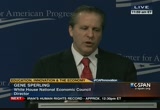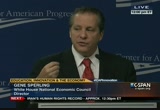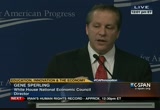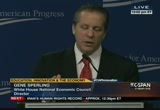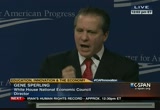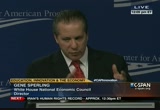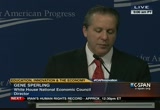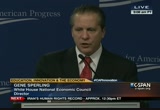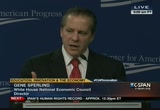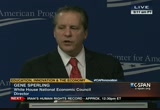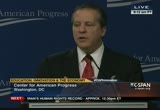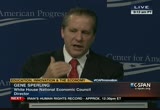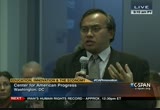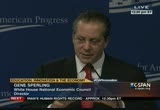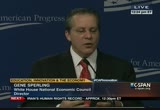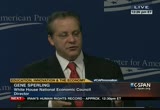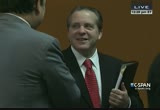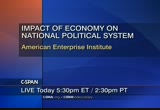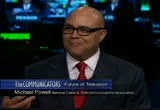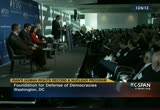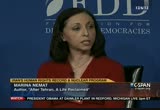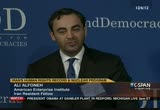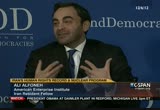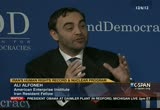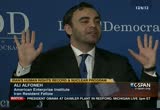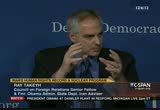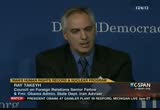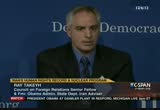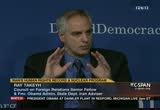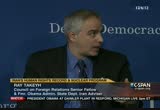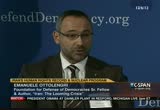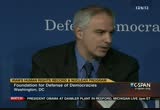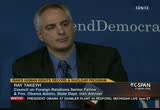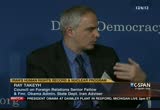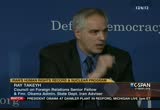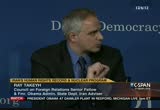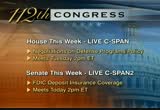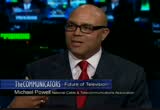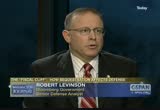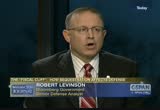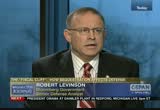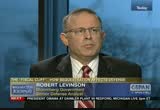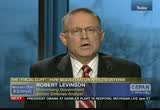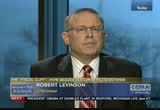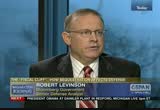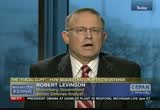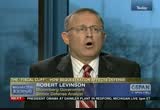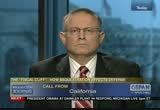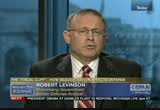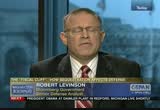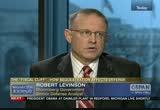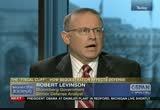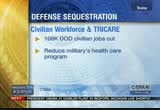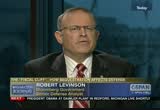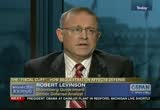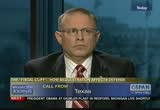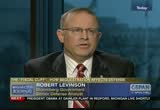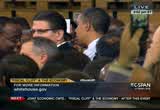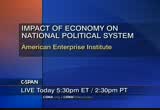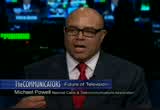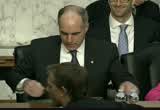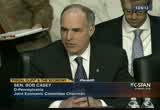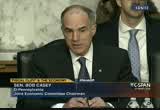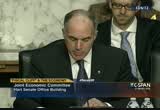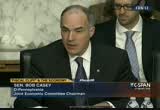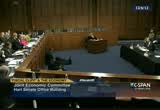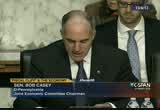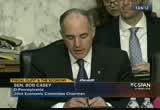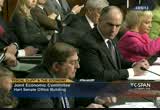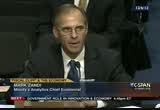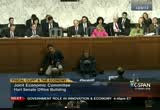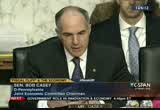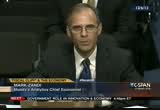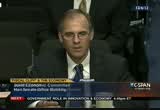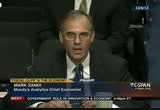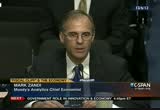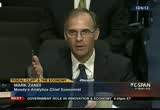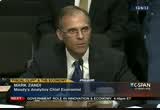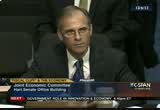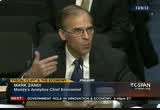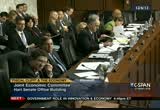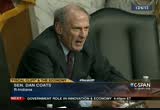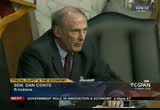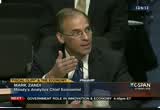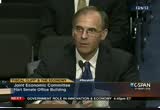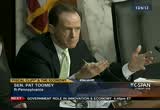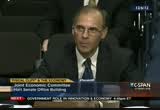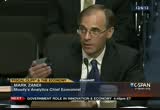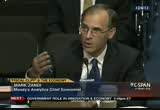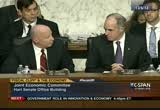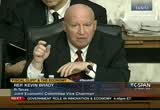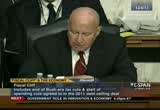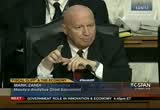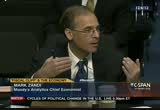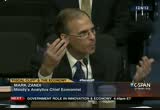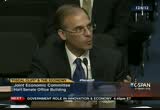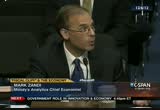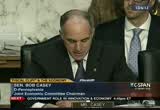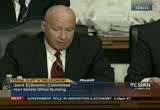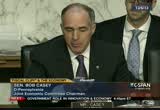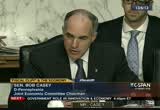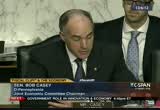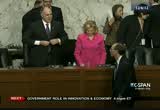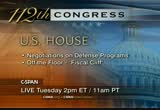tv Public Affairs CSPAN December 10, 2012 12:00pm-5:00pm EST
12:00 pm
, that that is a motivation to do things better and smarter. i think we need to be for change accountability but not a tougher hire double standard when it comes to young people from the most disadvantaged and troubled environments. environments. there is so much to talk about. in an area we have been talking about on the skilled work force or how much there is a skill gap, i think this is a critical issue. i think that for us to have clear policies, we need to do a little better in clearly defining the challenge. first of all, i don't think there is any question that the main reason we are having higher unemployment right now is not structural.
12:01 pm
it is fundamentally cyclical, fundamentally the lack of demand that is still in our economy as we recover from the great recession. that said, that awareness, that recognition that ben bernanke and former cea sheriff lazar -- cea chair lazear should not undermine that we face temporary or futures skills gaps but there is three reasons we should be focused on this. number one, even the unemployment today that is fundamentally about cyclical demand can easily become the next structural skills problem of the future. we know that one of the challenges we face right now in our economy is not just lowering unemployment, but lower and long-term unemployment, and that
12:02 pm
if we allow regions of our fellow citizens to stay unemployed for year or two years or longer, we know from study after study that they want more trouble establishing their skills going forward -- they will have more trouble is establishing a still going forward. there will be a crisis for us in the country, but we will also be sitting by and letting a new structural skills gap expand because we're not taking enough efforts right now to get people back to work and deal with long- term unemployment. secondly, there's clearly some immediate still a gap issues. you hear it in wilders, engineers, and we should be focused on that. third and perhaps most importantly, the long-term issue, which is really more, since we're talking about the future -- it is less of the current skills that and more of a supply-side issue. we should believe that if we have a large enough supply of skilled workers in the field of dreams notion that if we have the degree of skilled workers,
12:03 pm
it will help location of jobs to come here and we will be more of a magnet for the high skilled jobs of the future. i think that when we are looking at this, though, we should in our policy solutions make sure we are defining policies right said that we are having the right solutions. sometimes when people say "skill gaps, close to what they're talking about the absolute top of the top engineers and physicians. those people we talk about helping to address right now with high skilled immigration, others are talking about the supply of stem workers in our country -- science, technology, engineering, and mathematical workers and our country. sometimes they are talking about skill gaps wenwhere there is not
12:04 pm
enough to restore connection between how we do worker training and skills that are open in particular areas. all three of those are important skill gaps or skill issues, but they do not take with them the same policy solutions, and as we move forward, i believe that places like cap and others can help us to define which issues on the policies that address them. i suggest that we will be strong as one we have the larger skills comeback. many people come from silicon valley and talk to us about the need for high skilled immigration, and i agree. we do need to do more on high skilled immigration. the president agrees. but it is is stronger case to make that to the american people if that is one component of the strategy. one, not just of a comprehensive immigration strategy, but one
12:05 pm
component of a larger skills strategy which also talks about how we can increase the number of skilled workers coming from our country, u.s. schools, u.s. workforces. that is the skills contact at the country could easily get behind and support. that is highly important as we think of the skills issue going forward. some of the issues i heard talked about before critical to that as well. what are we doing in the pipeline? what are we doing from the earliest ages to make sure that under-represented groups are taking to science? why do we have to drop off at middle school around young women? what are the long-term strategy is? we have to attack this on all cylinders and have and all of the above the strategy. but while we are doing the long-
12:06 pm
term strategy to have a bit of supply of stem and high skilled workers, we should not take our eye off what we can do in the short term. one of the most powerful statistics that came out of the president's science and technology council was the idea that you could have a significant effect on the number of workers we had if you just ensured that you had a higher graduation rate among those who declared a stem major in their freshman year. taking up from 40% to 60% would have a significant impact, and that is not about 20 years from now. that is about two or three years from now. we can attack this on the short term and long term. second issue on innovation, very important to us and this president, is on the overall issue of research, basic research. i think this is a critical issue
12:07 pm
for us. we as a country have long been committed to having a strong research agenda, and we know that the areas where the private sector will underperform is on basic research and blue sky research. that is where nih and others have come in. to push my head into the budget issues for one second, i think there are a lot of people who come to talk to us at the white house who say, "i care deeply about whether you are doing enough on energy and manufacturing and research, deeply about whether he will help nih push us to the next frontiers of alzheimer's and other important biomedical research," and then say, "it is not really my business, i am not a budget%, to worry about whether we are pending on our discretionary budget." what i have to say to folks is that you cannot pretend you care deeply about innovation and
12:08 pm
research and investing in early childhood and investing in science and stem education if you are indifferent to whether or not we reduce our budget deficit by simply taking deeper and deeper cuts in domestic discretionary budget. at some point you skip to a point where you are simply treating of between -- trading off between early to childhood and biomedical research and higher education. those are not trade-offs the american public wants us to make. when we talk about getting our fiscal discipline, our fiscal house in order, i want to remind people that when i was here in the early 1990's, one of the clarion calls, one of the reasons people make that case, was that if we had expanding deficits, it wasn't just that we would crowd out private capital. it was that we would crowd out public investment in the future, in children come in modern
12:09 pm
infrastructure, and innovation. when we decide we agree to cut spending, which we need to as but in larger deficit reduction. those of you who care about innovation need to care about how you cut, how did this spending. -- how you do spending. we have cut domestic discretionary spending to its lowest levels since the eisenhower administration. that is something the president felt was necessary in these extraordinary times. but to cut another 10% or 15% will make the proposals being suggested here a moot point. i flag that for everyone. the third issue i will talk about before closing its manufacturing. this administration has made manufacturing a priority, and we are very aware that when you focus on manufacturing, there are some who will take a more
12:10 pm
classical and economic fiance that you cannot have a preference, or you cannot care more about any particular part of the economy, because then you're picking winners and losers, you're putting distortion. deadweight loss on the economy. i want to make the economic case for why that is not right. let's consider research and development. research and development is an area where there is strong bipartisan support and significance spillover benefits that go beyond the particular company doing research and development. we support our universities to do basic research, we skip the r&d tax credit to our companies, because we believe there is a benefit in innovation and growth that happens to our economy when that happens here that goes beyond the specific benefits of the individual company. i think that manufacturing for us done right, done smart, has
12:11 pm
that same justification. number one, manufacturing does punch above its weight. 90% of patents, 7% of private- sector research, 60% of exports come from manufacturing. secondly, location matters. studies show that when a major manufacturing plant comes into an area, the productivity of the nearby manufacturing also goes a lot. there are positive supply chain and ecosystem impacts that, again, go beyond the particular company. we at papers on -- we have papers on this, but for those who take more than the knee jerk and view on the stresses of manufacturing as a distortion.
12:12 pm
-- a distortionary policy, you should look at the research that suggests that location does matter, and it is right for public policy to have more manufacturing locations in the united states. notice how many companies are moving their production and design specialists together, on the same floor. why? they think it matters. bell labs, they think it matters to have production and design together, that there is a great benefit. the second point, which the professor from harvard makes so well, is that when you have an overall supply chain in manufacturing, when you suffer a period where that manufacturing base is eroding, a stop not just a temporary thing. it affects our ability to compete for the high level
12:13 pm
project. there an example is consumer electronics, where it might seem that one point that it was not such a terrible thing consumer electronics were produced somewhere else with lower-cost labor. what they are to that eroded our ability -- what they argue is that it diverted our ability to compete for the consumer electronics of the future. that test case for letting in manufacturing case become eroded, we can feel positive that what happened with autos was the opposite side. the fact that the american automobile industry was save or help to save itself or helped by president obama and the workers and the people there is obviously part of our -- part of the manufacturing success story in the united states is now. it may have saved over 1 million jobs. but i think it's got very
12:14 pm
important for the future. nobody doubts that the united states automobile industry is in a position to compete for the future jobs, which would not have happened had we let the entire supply chain become eroded. i thought one of the most significant quotes was from alan mulally at ford, because anything anybody with been taught in their macro- or microeconomic class would have been that if you have three main competitors, and two of them went out of business, the one standing would have been stronger. they would be taking more market share, would be more powerful and broader. it is striking and that ford motor co. ceo alan mulally said at the time, "we believe that if gm and chrysler would have gone into free-fall bankruptcy, they would have taken the supply base down and the industry down and turn the u.s. recession into a
12:15 pm
depression." that is the teaching moment about the power of the overall innovative skill said, the supply chain, and what that means for our capacity to compete when the company that would have been left standing thought they might have gone down as well. there is so much to say. i wanted to make these viewpoints, overall perspective, talk about manufacturing and research and skills, and i'm very happy to take your questions going forward. [applause] >> i think we have time for a few questions. i will call on people. if you could wait until he comes around with the microphone. >> thank you. aig investments. my question goes to innovation funds, which you brought out.
12:16 pm
at what stage are you focusing on with respect to either expansion or start-ups? on an execution basis, what is the regional plan as far as national strategy? >> look, i think for those of us in a government job, where you want to be like the classic economic book is you want to look for where we are under- investing as a country or where we have too little capital as a country calling to the private sector enterprises, where because of individual private actors do not feel they get the full benefit from those investments, but we as a country would be richer if there was more investment in those areas. one of the things we are trying to look at is -- the expression is where are the
12:17 pm
death, where are those places for innovative processes where they are not able to get the capitals to become one of the fast-growing companies? the hard part of the government level is you have to ask, is it a valley of death because it should be a valley of death? because it does not make sense for the private or public sector to be investing in companies like that? or is it a case where there really is a market failure, where it may not make sense for particular venture funds to invest in certain companies, but if we had a broader investment, some would prosper and we as a country would be better off? that is where you look for the type of tools you have with the sbic and other tools to see are there areas where it makes sense, where we as a country may
12:18 pm
be care more about how many small manufacturers have a chance to grow and expand, and even if there is a risk aversion in the capital markets, or it is not just the trend of the day, there is a strong enough public purpose for us to go in there. that is something we take very seriously and are having discussions with caramels and the treasury department about. we will be around for four more years, and we are open and eager to get suggestions. i would say that on a regional strategy, one of the very strong initiatives the president did forward was his national innovation proposal, and my thought was interesting there was that we propose to $1 billion so that we could do 15 or 20, and when it did not look like the congress was going to pass that, the president said to
12:19 pm
us, "can you pull together enough money in the federal government to do 1 pilot?" we passed the hat and did $45 million. when we put the proposal forward, we received 13 partnerships. tremendous cooperation. we were only able to award one. it went to a collaboration in youngstown, where the partners included not just case western, but carnegie-mellon. it's the excitement about that, and the excitement that you are doing something regional, where you have pennsylvania, ohio, and the west built stream together instead of the way things typically are, where it is a particular state or parke -- particular state or city looking for that. we have seen there is enough interest at 13 partnerships would apply for that. that shows the promise of the strategy, which has been used in germany, of the national
12:20 pm
manufacturing innovation hubs. that is something we will to promote in a second term and expand further. >> over here. >> thank you. every child matters. i applaud you for your comments about the need not to have less having money for children versus money for research and other vital needs in the domestic discretionary budget. the question is, where do we find more revenue? and have you considered taxes on stock transfers and stock transactions or other kinds of innovative -- carbon taxes, other kinds of approaches where we can find new revenue that it would be possible for us to have amongst ourselves for important resources? >> it is going to shock you to know that i'm not here to make news on a new revenues. [laughter]
12:21 pm
we are busy fighting right now to make sure that we have a budget agreement that is very balanced, and part of that balance is having enough high income revenues together with smart entitlement savings. that is the balance that people talk about the most. the other balances to make sure that you are putting together a package that does not handcuff us not only from creating jobs in the short term, but long-term investments. one of the things that i would stresses that you don't want to go further in debt reduction in the way that the house republican budget does, which is another $1 trillion in steep cuts in the areas of our government where we fund early childhood, biomedical research, where we fund the national science foundation, and so many of the other drivers of innovation and economic growth.
12:22 pm
i do think that the challenge for us as a country going forward is in repairing the damage that was done to escalate from the great recession -- damage that was done fiscally from the great recession, that we give people confidence that we're bringing down our debt and deficit as percentage of the economy and bgiving people more confidence in long-term investments here. at the same time, we do not start of what has been so much a part of america's -- do not starve so much of what has been a part of america's history, our willingness to invest in the future, and that includes children, poor children, modern infrastructure, basic and blue sky research. when we get beyond the challenge we face over these next few weeks, i think that is going to be a broader challenge we face over the next decade.
12:23 pm
>> i think we have time for one more question. over here. as the question is coming, i want to say how much we support the president in this fight on ensuring the balance, and the president has been very strong on that issue. >> richard singer. we are a biomedical company that helps nurses and doctors, may collaborate better with social media. we got a small amount of the innovation funding, but it is a broader question about the health care ecosystem. if the company goes under, all the software engineers get new jobs in a matter of weeks. but in biotech, we have a lot of people with ph.d.s, longer-term and specialized types of areas, and we don't seem to have the same kind of resilience. it seems that part of that valley of death is part of the
12:24 pm
issue of the ecosystem. you hear about mobile help companies that are having trouble getting off the ground and getting things quick enough because part of the valley of death is the regulation and the telecom regulations coming together on these new types of things. i'm wondering if you could compare and contrast and about how we foster a more vibrant amelioration of the valley of death for biomedical, since we have such a pristine asset in this country. >> let me make a couple of points. number one, as you mentioned health care, i feel obligated to say that there is probably a few areas that -- probably few areas where innovation is going to be more important than health care. one of the points that the president makes repeatedly is that the only good solution in dealing with our health care challenge is doing things that lower health care expenditures while increasing health the value that people receive.
12:25 pm
other things you do or cutting the cost shifting. there are even raising costs to try to lower what is on the .ederal books but the thing that is best for our country is if we have the type of innovation and continue to push the type of innovation that lower as health care -- lowers health care spending that just because you're caught shifting but that you are showing you are getting better value it at a better cost. as long as there is the understandable focus on what entitlement savings will be part of the long-term budget, making sure that we're doing everything we can to expand and test and in ave with some of the reforms that are in the affordable care act, i hope the focus going forward.
12:26 pm
we have gone through a political period where there was stress on would survive, would it not survive. now that we're past that and we know these simple law of the land, there is so much to gain not just from a bipartisan effort, but an effort through the entire expert and health community to look at which of these reforms are working, which of these innovations are working, because this is the true answer to our long-term health challenge. when i left government last time, there were 40 million people on medicare. in 2020, there will be 64 million. you cannot repeal the retirement of the baby boom era. you cannot appeal that -- you cannot repeal that, and you do not want to provide less to
12:27 pm
people who of work hard their whole life. the ultimate goal must be this type of innovation on health care. on biotechnology, i cannot keep you a specific answer other than to say that there is a growing recognition that when you looking for areas of promise in the united states over the next 10, 20 years, there is enormous promise in this area, not just -- most importantly, what it means for health and life outcomes, for our economy, jobs, entrepreneurship. this is an area will looking closely at, and an area where it ideas where negative, valley of death in terms of capital -- for people listening, that does not actually mean a valley of death. [laughter] it means you get to a certain point in the formation of your company where you cannot get the
12:28 pm
financing you need. that is an area which should be looking closely at, but with the appropriate rigor. >> thank you so much, gene, for ending a great day. [applause] i want to thank susan molinari and yourself on a great partnership with google and harvard for a day that i hope will stimulate people and remind them of the importance of the investments. thank you. [applause] [captioning performed by national captioning institute] [captions copyright national cable satellite corp. 2012]
12:29 pm
>> president obama travels to michigan today. he will be speaking to autoworkers in a plant outside detroit about extending the bush tax cuts for the middle class. the president met with john boehner at the white house to discuss a deal to avoid the automatic tax increases and spending cuts that are set to kick in at the beginning of next year. we will have live coverage of the prison in michigan starting at 2:00 p.m. eastern. -- the president in michigan
12:30 pm
starting at 2:00 p.m. eastern. at 5:30 p.m. eastern, how u.s. debt, economic growth, and baby boomers retiring could lead to political and economic change. also, the u.s. senate meets today to continue debate on extending insurance on higher deposit announced. live coverage begins at 2:00 p.m. eastern on c-span2. the house gavels in a tomorrow. we will have live coverage tomorrow at 2:00 p.m. eastern here on c-span. >> i think people still love discovery. they are ready to find the price -- find surprises. every month or every year i google about some show that people are talking about that you could never imagine choosing, because you could say, but "mike, i want you to choose
12:31 pm
certain foodo,' or channel networks." i don't think that if i had to be determined that was my preference that i would have ever picked them. but the ability to stumble on them, when i hear people talking about them and i go into environment and gathering around and suddenly find, "you know boo'"i like 'honey boo and i and watching it, that is a part of the experience and it gets sold short. a lot of americans love the enjoyment of this deba -- the scaping passivity and roaming around the tv jungle and finding things they did not know were there. >> michael powell on the future of television to night on "
12:32 pm
the communicators" on c-span2. >> a former iranian political prisoner on the abuse she suffered. the foundation for defense of democracy is held this discussion. it is about an hour. >> good morning, it is a very interesting panel so i want to get quickly into questions. i want to quickly set the stage -- i don't need to tell anyone in this room about the death of the problem of human rights abuses in iran. i would just read briefly from the report that the u.n. special wrote and file to the u.n. general assembly in september of 2011 when there was a pattern of systemic violations of human rights. iran has refused access to the united nations special representative on human rights.
12:33 pm
in september, 2011, the un secretary-general submitted a report to the general assembly in which he said he was "deeply troubled by reports of increased numbers of executions, amputations, arbitrary arrests and detentions, unfair trials, torture, and ill treatment and bemoaned the crackdown on human rights activists, lawyers, journalists, and opposite -- and opposition activists." one example from the week's news -- there was what qualifies in iran as a some good news -- a well-known human rights lawyer ended her 49-day hunger strike on december four. she has been imprisoned since 2010 and the regime had imposed a travel ban on her husband and 12-year-old daughter.
12:34 pm
she was on a hunger strike for 49 days and has actually stopped of thunderstrike amid an indication that the regime will lift the travel ban. the victories are small and hard won and the news is relentlessly negative but it comes at an interesting moment both for iran which has parliamentary collections of next june typically when there is that democratic process, there is even greater pressure and international scrutiny on the iranian human rights record and temptation by the regime to be even more repressive. likewise, the obama administration, with the president's reelection, faces an interesting set of questions about how best to continue on the strategy of trying to prevent the iranian nuclear program from arriving at the point where they are able to
12:35 pm
produce a weapon. and how you tighten anti- proliferation policy with a human rights policy is an issue that has often been difficult for policy-makers to reconcile. why don't i quickly opened it up? maybe i will start with marina since your experience is so personal and maybe ask you, and a basic level, whether you think life for ordinary iranians has gotten better or worse in the last few years. give us your best sense of what the human rights landscape looks like today verses say five years ago or a decade ago. >> i guess this all depends on how much people know hear about the absolute disregard for human rights in iran. i don't know how much you know about it in 1979, when the revolution succeeded, we had
12:36 pm
hoped that the promise of freedom and democracy, we had hoped iran would become a democracy but that was not the case. my dad was a ballroom dancing instructor and i am a christian from iran. dancing became illegal and singing became illegal and holding your boyfriends and in public became illegal and, in school, we had to cover our hair and ourselves. i had grown into wearing miniskirts and tight t-shirts and i was dancing on the beach wearing a bikini and all this became illegal. in the classroom in math and science and literature, these are the early days in 1980. our subject were replaced by government propaganda. i had grown up reading jane austen and ernest hemingway and now, i had to face propaganda eight hours per day. i was 14-years old. what you think, honestly, having something become illegal?
12:37 pm
what you think the average teenager -- how political can 14-year-old get? you ban fun and the 14-year-old becomes political. that was the basis of all the protests that began in iran after 1980. sharia law came into place in iran early after the revolution and then democracy and freedom of the citizen is impossible. the same laws that govern iran in 1979 and 1980 are still in place. there have been some cosmetic changes here and there depending on what administration you have. things got a little bit better but there were things you get
12:38 pm
away with like male college. does that really make a big difference? -- even get away with things like nail polish. does that really make a difference? no, the same set of laws would still govern iran. under this constitution, freedom and democracy and i ran is impossible. i'm sure you all know about the american hostages. the movie "argo" just came out after the hostages were released, i was in prison in a rent. -- in iran. the leader of the green movement was the prime minister. i was bound with a length of cable. they beat you and beat you at once you were so swollen your skin is about to burst, then they make you walk. when the swelling goes down,
12:39 pm
they beat you again. it is a cycle. are things any better now? no, they are not. it is not worse or more systematic. that is the situation in iran. when the american hostages were freed, thousands of young iranians were political prisoners in various iranian prisons. the world did not hear about them. we were thinking this cannot be real. 90% of us were under the age of 20 and we were waiting for the world to say something and news does commit to the prison. nobody said anything. the world did not care. the world did not know. i don't know what was warm with the world but there was something definitely wrong. that is why i am here. i am here to make sure that the story of the iranian political prisoners including the ones who are now in prison is heard and my heart goes out to
12:40 pm
everyone of them. if you are interested in helping them, please come and see me afterwards. thank you. [applause] >> ally, i'd like to ask you -- in the last few years, those of us who write about iranian sanctions policy have heard a lot about the increasing power and ubiquity of the islamic revolutionary guard corps and hillary clinton, a couple of years ago, said that iran was edging closer to being a military dictatorship. when marina talks about the long history of abuse of political prisoners, wonder whether the agents of that abuse have changed over these 20-30 years and whether the increased role of the irgc has an impact on the human rights landscape.
12:41 pm
has the power of the military and i ran things worse? >> thank you very much ladies and gentlemen and thanks for arranging this panel discussion about human rights. it is rather interesting that in this city, washington, d.c., most panels about iran are about the nuclear program. there's almost nothing about human rights. this sends a terrible signal to the iranian public. it means that you care about your own security. you care about the implications of the islamic republic becoming a nuclear-armed state but what happens in iran does not really matter to the washington elite. this is the signal washington has been sending to iran and i think this panel and the initiative to make the human rights issues more important
12:42 pm
sends the right signal to the iranian public, telling them that you do understand that the government which is restricting its own population can also not be trusted when it comes to its international aspirations. imagine how it would be paid to behave. concerning the role about the revolutionary guards, it has inherited the religious state, something that was discussed by the previous panel. when the ayatollah khomeini was making press -- promises to the iranian people and 1960's and 1970's, he promised the people of iraq and not democracy. he promised them justice in this world and salvation and the next. no one has returned from the other world to tell us if they actually achieve salvation. [laughter] we know there is no justice in this world for us.
12:43 pm
the system is legitimizing its abuse of the population, its corruption by reference to the holy book. yes, iranians are mostly muslim. but their understanding of islam is different from what the government of iran is imposing on them. at the time you were in prison -- dr. namat was lucky because at that time we had a prosecutor general of the revolutionary tribunal. he was also called the hanging judge of teheran. one time he was invited to province of kurdistan to look at a group of prisoners.
12:44 pm
i believe there were 100 kurds who had done some counter revolutionary activity and the big judge did not have time to go through all the cases. he just said shoot every second of them. he said -- he was told some people may be innocent. he had a sense of humor. he said in a fact, they will go to heaven if they have committed a sin against the revolution, they have received their punishment. this is how the system was working back then in the 1980's. is a different type of system now. you have the revolutionary guard officers which are a new generation of iranians. they are replacing the old clerical class. the old clerical class spent its time that universe to agree the new generation spent its youth
12:45 pm
at the iran-iraq war. also a world war i. the germans wanted to correct the injustice of the past. that was more important than making germany a better country in the 1930's and 1940's. unfortunately, we see a similar tendency among these revolutionary guard officers. they no longer have a religious-based the same with the clerks have but they are using terror in order to control the population particularly, they are fond of show trials. we have people who were the rulers of iran and the 1980's who today themselves have become prey to the system they created.
12:46 pm
they have become prey to the system. the show up at trials and later confessed being agents for the cia and the mossad and the mi6. even the public wonders how much time that have during the week for public services. no one believes that. not a single irony and believes that these people who served the revolution in the first decade have completely become counterrevolutionaries. the kite the it is used to instigate and put fear into the heart of the iranian public. the prime minister was chosen by the ayatollah khomeini. is he is not safe and has to appear on show trial and people were capped at ministers have to appear, and i, as a simple iranian citizen, i am totally at their mercy.
12:47 pm
this is the change which has taken place. >> thanks, ali. emanuel, want to move on to you about the indifference that marina felt during her imprisonment about the outside world and given ali's surveys and that having panels on the human rights record of iran is somewhat of a novelty in washington -- what does that say about what the west is doing? what measures are the united states taking specifically aimed at iran of its human rights record as opposed to poor for rationed or anything else? >> i want to thank my co- panelists and the ftd for giving me the opportunity to speak today. does a pleasure to be here. -- it is a pleasure to be here. the last couple of days, i wanted to look specifically at the kind of policy tools that
12:48 pm
are present in the basket of western policy vis-a-vis human rights in iran. i found a useful summary page of everything that has to do with human rights. the one thing that jumped to my eye as a great contribution to human rights on that page was the indication that european guide lights on human rights on a vast variety of subjects from women's rights to freedom of speech was also available in farsi alongside the other 22 languages of the european union. it struck me how amazing this. i'm sure millions of iranians are rushing to the west side of the european union to read the guidelines of human rights
12:49 pm
which clearly are having a great impact on their lives. one of the problems we are confronting -- it is a real problem -- you clearly both alluded to it -- we are confronted with a huge dilemma. we want to stop iran from having nuclear weapons and there is a widespread belief among policy makers that if you pursue a policy of support for democracy promotion inside iran at the same time, the regime will move away from negotiations. if we have to choose between depriving the regime of nuclear weapons or depriving the regime of its power inside the country, it is easier to achieve the former rather than the latter and it's better over all -- that we can live with an authoritarian iran without nuclear weapons and when we try to pursue a free iran, we might
12:50 pm
end up with an inimical nuclear-arms authoritarian iran. it is an understandable dilemma but it doesn't serve our purposes very well and we have not invested significantly on creating human rights. there is a lot of things we can do to increase our policy basket. i think there is also something expedience and instrumental amplifying the support for human rights in the sense that if we want to force the regime to make a choice between a nuclear arsenal and survival, the best way to convince and it is time to negotiate is to tell them that we are going to do everything in our power to bring you down before you achieve a nuclear weapon. also, supporting values which we believe are intrinsic to human nature -- we call human rights because we believe they are interested to what we are --
12:51 pm
it is not a good thing to be standing for human rights where it is convenient and not supporting them outside the western world. there is a long list of reasons why we should be more active. there are many things we can do. one thing i think that would work well with the iranian public is to speak and use the tools of public diplomacy which we have in our power more effectively and more insistently to convey the message that we support democratic change inside the country and we want to see the region held accountable for human rights. to give you a practical example -- one thing that is transpiring through the work that i am conducting and my colleagues are conducting is that while we are making it extremely
12:52 pm
difficult oftentimes for real, true dissidents to come out of iran were once they are out, to get support from western governments and become active in the promotion of change inside the country, we are rather lax when it comes to providing but visas to members of the regime, former members of the region, children of members of the regime who are freely coming to the west to spend time as research fellows at ivy league universities, who are buying property and investing in our own markets, who are spending time at respectable institutions, who are using our financial systems to enrich themselves. i was recently told of the son of a prominent member of the, then a judge cabinet use the two-tier exchange --ahmedinejad administration would come here
12:53 pm
earn money and go back to iran to buy an apartment. these happen on a daily basis that are enraging iranians of all walks of life, that we are allowing out of probably negligent or underwhelming due diligence when it comes to our immigration policy, who comes in and who goes out. if we change just that, we would send a powerful signal inside the country. >> ray, you wrestle with these issues in the early days of the obama administration. i wanted to put the same question to you which is held does one integrate or reconcile an aggressive policy on human rights with a policy that is very centered on non- proliferation? is it possible to do that?
12:54 pm
it was suggested there is a way. do you agree with that? by way of setting the stage, the administration took a fair amount of criticism after the green revolution for not speaking up strongly enough and early enough as the crackdown began there. it is worth noting that about a year ago, u.s. announced a set of sanctions on irgc and other officials on their human rights abuses which was somewhat different. the sanctions were different than the typical sanctions which are very much aimed at proliferators. this was a set of human rights such its of the administration would argue that they have tried to grapple with this. how would you answer that question? >> i hope everybody can hear me. when you look at this issue,
12:55 pm
which is not strictly a u.s.- iran issue but is embedded in an international structure that began to deal with this issue as a proliferation issue about 2005-2006, since then, the iran issue has been ensconced in a context -- in a context of international organizations. the basis of the being in those international organizations is that the i ran's violation of the irgc violations. for all the countries dealing with this, the british, the french, the germans, russia, china, they all tend to view this as a proliferation problem. the conversation between iran and the other side tends to be
12:56 pm
about that issue, very narrowly focused. to kind of move that conversation, you have to figure out a different kind of architecture. the five plus one process, as such, is designed to deal with the corporation issue and the composition is that has to do with the iranian violation of the mpt and there have been 62 -- six security council resolutions that suggests sanctions. there are two countries who suggest that the issue between -- that this is not a proliferation issue but has to do with the character of the regime and one of them is israel who does not view this as strictly an arms dispute and the second one is iran who similarly suggests that although it is an arms control issue, they are really using arms control as a way to undermine the regime. there are two actors in this particular conflagration who are not accepting the argument being that this is about
12:57 pm
nuclear infractions as opposed to the nature and character of the regime. if you look at it historically, the united states has managed to negotiate successfully arms control treaties with countries of the use of the citizens it tends to century. -- censure. the history of dealing with the soviet union on various occasions particularly in the 1980's when you begin to see a very aggressive advocacy on behalf of dissidents that were taking place. i thank as possible for those things to coexist. as was mentioned, there are a set of sanctions you can introduce that have to do with human rights abuses. more can be done with the human rights representative who was not allowed to go into i iran or turkey. i think we have to have some degree of modesty in approaching this issue because there are some limitations to
12:58 pm
the ability of the united states and the international community to effectively alter the behavior of the iranian regime is that have those determinations. you cannot introduce a shank -- sanctions regime and more should be done about advocacy about those iranians in prison. the iranian regime tend to be sensitive to that sort of review. in the 1990's, the europeans invested considerably in the prison systems in iran. there were some modifications on that. those things can coexist with an arms control approach. the arms control approach is likely to be predominant. that is just the reality of the situation. that is because everybody agrees and this is an issue they have to pursue and i have agreed this is an issue of imminent danger.
12:59 pm
i am not quite sure if it is much of a crisis as is suggested. nevertheless, everyone has been vested in this issue. the other actor i think people don't really talk about as much -- if you look at the history of the american foreign policy -- many of the human rights initiatives tend to originate on capitol hill. you can look at the treatment of the soviet regime and the objections of scoop jackson, you can see the history of this. the bureau of human rights in the state department was originated under henry kissinger as secretary of state. he had no particular interest in human rights. he had to concede to that because of the pressure coming from capitol hill. a lot of external groups can have an impact on this particular issue. an arms control policy or arms control objective is not going
1:00 pm
to be imperiled by having corresponding human rights campaigns. that is a thing that we have convinced ourselves of, that an arms control approach cannot coexist with the human rights control. i am not entirely sure that is accurate. i believe those things can coexist. >> i wanted to follow up on one point which is that there is a framework in place for >> there is sort of a framework in place with iran.
1:01 pm
it seemed like a last-ditch stab at diplomacy. with a bilateral negotiation to come about give the u.s. and opportunity to engage on human rights issues? the general policy has been the u.s. wants to keep it limited to arbs control. is that proper or would there be an opportunity for the u.s. to engage with iran and these other issues. >> there has always been a conceptual dispute. there is a group that suggests that the agenda should be kept in a narrow because otherwise, it gives the irony is the opportunity to divert and talk about afghanistan and bahrain and syria. the agenda has remained narrow as a means of focusing the issue of our principal concern, namely proliferation. the second school of thought suggests the agenda is broader
1:02 pm
and perhaps you can have agreements on other issues that would mitigate the debt -- disagreements of the nuclear issue. as far as i can tell, that has never been resolved. when an issue remains not result, the status quo tends to prevail. given the fact that the issue of the bilateral conversation is introduced as a last-ditch effort, it is likely to remain more focused. should be considered a last- ditch effort? i don't think so. we always talk about the year of this or the year of that. we always think of it as not having enough time. yet there is always more this issue seems a degree of time flexibility. we have had bilateral discussions before. i suspect there is a bilateral
1:03 pm
conversation that it will attend the discussion. said a moment ago we need to have a sense of modesty about what we hope to achieve. i would be interested to hear what your view is on that and also, as we look forward to the 2nd obama interminable what you would hope for from him and the united states in terms of the posture they take and the amount of pressure they bring to bear on iran. how much of a difference would that make? purely on human rights -- any westernhink country can change the behavior of the iranian regime when it comes to the way it treats political prisoners and dissidents. i think that is the realistic view. as i told you, when i was in prison, the world was absolutely
1:04 pm
silent about the fact that there were about 40,000 or so political prisoners and iranian presence. 90% under the age of 20. what the silence of the world did for us who were imprisoned in iran at the time was that it robbed us from hope. yes, you cannot change the behavior of the iranian regime. what you can do is to give 7000 political prisoners who are right now in prison, you can give them hope. the news does get into the prison. if they actually hear that you, in the united states of america -- i promise you they will hear this -- you are standing up for them and not about this whole
1:05 pm
masquerade of the nuclear thing. this has almost become a joke. if they hear that, you would literally be saving those political prisoners of lives. i have the luxury of not being a politician. i was in a political prison and i saw with my own eyes how thousands of young teenagers who were brutally massacred after being tortured and raped under the name of islam and religion. to be honest with you, all i am interested in is just saving one life. if i can save one life, then i can die in peace. i know the arguments are political. for me, it is an issue of practicality and it is an issue of saving lives. >> ali, you wanted to jump in?
1:06 pm
>> if i can give one piece of advice for president obama is to do exactly the opposite of my good friend ray - never show modesty when you are negotiating with middle easterners. [laughter] after all, we know something about trade. we know something about negotiations. you go to the negotiation of a limited expectation and modesty, you lose everything. you have to start here and maybe there and that is the attitude you need to have. >> i wanted to ask a question about the relationship between a strategy of economic pressure which the u.s. and the west is pursuing against iran and human rights. the u.s. claims and the p-5 claims and there is evidence for it that this devastated the exports of iran and devastated the currency.
1:07 pm
there's a counter argument that to end up punishing average iranians and this process. nevertheless, there is clearly, for perhaps the first time, evidence that we have some options that may deserve the phrase "crippling." do you have any evidence? i will start with emanuele, is this pressure weakening the region and does a weaker regime respond by only cracking down harder or is there some scope for hope that it might actually help the human rights picture in iran? >> there is evidence that the regime has been cracking down harder and harder on broader sectors of the population. that in and of itself is evidence that the regime is increasingly on the defensive. we know they have a problem. the way they managed to parliament early elections is
1:08 pm
another piece of evidence. they will not take the risk of another 2009. i anticipate with the president- election next year, you'll see more of the same. they will just not allow millions of people to show up in a free election to see how it goes. that is the first point. the second point is that, as was mentioned before, we have a problem with ordinary iranians in conveying the message because we are perhaps still stuck in this motion that troops will eventually spring forth in and of itself and the iranian regime is doing a fairly good job in advancing its own case and i ran but also in the west. we are not treating them with reciprocity when it comes to their own tv stations and their own efforts to invest their own argument. we should address had on with
1:09 pm
more resources the arguments that the regime is making that sanctions are causing a humanitarian catastrophe for ordinary iranians and the attempt by the regime to suggest that our policy will increasingly look like the iraqi sanction policy which harmed hundreds of thousands of ordinary iraqis. the third point is that we have to fine-tune our sanction policy to increasingly go after the people inside the regime or who are in proximity to regime that are greatly benefiting from the skewed balance of the economy in the current situation. i want to give one example of things that can be done. i believe we all understand corporate responsibility. when there is corporate malfeasance, as much as the company that gets fined or the bank but it is also senior
1:10 pm
management, the people who were person responsible for these issues. we have sanctioned hundreds of iranian companies but most of the ceo's and the senior managements of those companies who are members or former members of the revolutionary guard, the senior management part of the revolutionary guard. they are not sanctioned, free to travel, and free to have bank accounts in malaysia and places where they're able to move about. we should go after them as well and make it known to the irony is that our sanctions are not going after ordinary people.
1:11 pm
>> i would like to open it up to questions from the audience. when i call on you, identify yourself and address the row? >> i addressed this to any of you who talked about the p-5 +1. if you studied the persona of baroness ashton, it would be hard to find a person anywhere in the world more unsuited to successfully lead this kind of negotiation. how can you attach seriousness to a negotiation headed by her? i will not go into details but anyone who has studied her understand this. >> who wants to take a crack at this? ray? >> that's just the structure that has evolved to deal with this particular issue. the foreign minister of the european minister takes that position as representing the european union.
1:12 pm
the united states and other countries are represented. some of these structures are just continuity. they have evolved and they just persist comes into that and the personalities that commit to that are the function of those particular organizations. in this case it is the european union. we tend to focus a great deal on who was on the other side of the table. there could be the british or american representative of the problem with the p-5 +1 is who is on the other side of the table. these discussions are still made not because of lady ashton but because of limitations and the approach they have had to this particular issues. the stalemate in these conversations should be directed toward the other side of the table. >> this lady down here in the front.
1:13 pm
wait for the microphone. >> this question is for marina - how did you gain your freedom? >> it is a very long story and i have written two books about i am afraid i will not sit here and tell you but i was in prison for two years and during that time, i was tortured and i can close to execution and i was forced to marry one of my interrogators who was a member of the revolutionary guard and he threatened me that if he did not, he would arrest my mom and dad. i did that for my family. i'm from a christian family and he forced me to convert to islam i had lost my freedom, my family, my name, religion, dignity, everything was lost. i found out this man used to be a political prisoner during the
1:14 pm
time of the shah and when the tables turned, he became an interrogator and torture were within the system. after he was assassinated, his family were good people, they intervened and they've government officials and got me out of jail. they would not give a passport for six years but i got help from other places and i had to pay a huge sum of money to the iranian government and i have a receipt. i will climate with interest one day. [laughter] after that, i got the passport and had it in my hand and had a two-year child and i married my boyfriend who was an organist at my church and now we want to exit iran and no country would
1:15 pm
give us a visa because they knew that we were going to claim refugee status as soon as we landed anywhere. my church near the spanish ambassador. he gave us a visa only if we did not claim refugee status from spain. imagine, we got to spain and when not quite sure where to go my husband had family in the huingary but iranian officials have tons of money and they find homes on the west because they bring their money with them. the dissidents come with the clothes on their back and when we landed in canada, we had $200 in our pocket. we were literally hungry and no country was taking us. finally, canada did, and i am so grateful to this great country of north that get this a home where we had nowhere to go. i just need to make a point --
1:16 pm
are we going to get time at the end? >> sure, will have time at the end. >> there is something i really need to mention. -- >> good morning and thank you. we have been working with people or former political prisoners and with the appropriate movement in iran. is clear that president obama will cut a deal or try to with the iranian regime over their nuclear weapons program that will, in fact, sacrifice the people of the iran. i would like to ask ali if you can add to some of those good suggestions that emanuele made earlier about tying in the human rights agenda and the nuclear agenda.
1:17 pm
i believe the best investment we can make is help the people i read get rid of the regime. >> thank you for the question. the united states has a fairly good experience in this regard many people in the group assembled here today belong to the right age group. you remember, some of you, the bad old days of the cold war but you also remember how the united states managed to start the helsinki process with the soviet union. the idea was that negotiations between the u.s. and the soviet regime -- and the iranian regime should not only be about nuclear proliferation but also a human in. in the soviet society, they felt there is international support and i knew there was a
1:18 pm
government outside their own totalitarian system trying to give them a push. that was important. another important fact was that you had very good strategists managed to organize some of the people who have left the soviet system and became opponents of it. you gave the boys to the opposition here in the u.s. and you also managed to raise the cultural warfare against totalitarianism. not only the intelligence services but the universities, the academics, they managed to mobilize the opinion of the people in the world against the soviet regime. i don't see that today. let me tell you what frustrates me as an iranian. i see american academics raging war and demanding closure of guantanamo beg for years and
1:19 pm
years but no one, and none of these do-gooder's talks about human rights in iran. where are these good people? those good people who talk about human rights in secular regimes in the middle east have totally forgotten us. i have an idea of why this is. i believe that many of them are communists. [laughter] yes,they still are even after the end of the cold war, they are communists. the only side with the enemies of the united states. they believe that the enemy of my enemy is my friends of the islamic republic of iran is critical to the united states, then they are a friend of me teaching at berkeley.
1:20 pm
just to mention one of the liberal institutions. that? [laughter] >> was pure accident. that is such a shame but use of the cold war. try to engage some of the people who showed the united states government during the cold war how to wage cultural warfare. not only the people who manage to make "dr. zhivago" to a movie. why is there no iranian "dr. zhivago?" you have to wage war against not only those who are not your enemies but opponents of the vast majority of others. [applause] >> i wish we had a berkeley professor to call on now. this gentleman here. >> thank you and thanks to the panel. i'm from fdd.
1:21 pm
i think this might be addressed to ray would be interested in what the other folks might think about this -- i don't know if you remember, i think that was the first u.s. official associated with this back in 2007 when i had a discussion with the european diplomat and i use the phrase that this was the year of the decision and he ran off to "the washington post." he thought we were about to launch bombing operation. i meant the year of decision for the bush administration as to whether they would deal seriously with iran or kick the countdown the road. tension between the nuclear deal and human rights. a hypothetical -- if we reach a point where the rubber meets the road and through some
1:22 pm
combination of sanctions and iranian fear and concern for the survival of the regime, they come forward and more able to get some kind of credible deal, but the iranians incest that repeat something like in the algiers accords in 1980 when we got the hostages out of the first one or two provisions in the accord was an american commitment -- commitment in iranian internal affairs. -- non-enter france in the iranian internal affairs. it requires president obama to make that kind of concession, at least verbally, i think the president will go for that. maybe the president thought the key to getting a nuclear deal was to go out of his way publicly to assure the iranian regime, the islamic republic of
1:23 pm
iran, that we had in fact no business interfering and we are fine with the status quo. what are your thoughts on that? what you think the impact of that would be? >> i actually attended berkeley. [laughter] bat. >> one of the challenges in the international community is if there is some sort of nuclear deal -- the man at the nuclear deal is signed, a new phase of the arms control problem emerges which is called compliance.
1:24 pm
there is the question of whether the treaty will happen. how do you sustain pressure on other aspects of sirenian miss behavior in light of the nuclear deal? human rights is one and i will come back to that but today, the islamic republic stands convicted criminal lawyer accused, but convicted of terrorism on the american homeland with the conviction of the plot to assassinate the saudi emissary. these are the first ones to do this since al qaeda targeted the american homeland. my hope would be that the united states, particularly in the context of today, cannot discuss these issues with the iranians purely as a technical agreement or disagreement on nuclear programs. the way the countries treat their citizens in the middle
1:25 pm
east, has entered the norm of the american conception of the middle east. that had not been the case in many times before. the case of libya and the prospective interventions in syria and a greater degree of support -- suddenly, the right to protect and how citizens are treated by their gyms have entered the political calculation of western countries about the middle east that had not been there before. i would guess that we will continue that advocacy and we should. we should continue sanctions about how iran treats its citizens and neighbors. that has to be considered and i think it would be difficult to do that in terms of the international coalition which i think will go away. that would be the challenge of a post-arms control treaty for any american administration.
1:26 pm
>> we are really running out of time and marina had asked for time at the end. left. >> thank-you, talking about what should be done about iran, i need to mention this because it has been bothering me. you might know that the dissident organization in iran was taken off the terrorist list in the u.s. not a long time ago. during my travels, i have run into many u.s. politicians that support this decision and i am absolutely against it. mujahaddin organization, this comes from the word jihad and this organization was created in iran and the 1960's and it is a marxist-islamist organization
1:27 pm
and it assassinated many shah government officials and even farmers that worked in iran. during the revolution, the support of the ayatollah khomeini but after the revolution, they thought they could outsmart his people and they couldn't but many of them ended up in prison. they sided with saddam hussein during the war with iran-iraq and attacked iraq and the revolution regard heard them and they got supporters and many of my friends who were teenagers were massacred in 1988. some politicians told may that the group does not kill anybody in the past 10 years. i say that you are telling me that if i tried to kill your father, after 10 years and i
1:28 pm
don't kill anybody, i come back to you and i said i am sorry i killed your dad but i will go free because it has been 10 years and have not killed anybody. issues. the enemy of your enemy is not necessarily your friend. let's imagine that the government of iran solves the problems, what will take its place? this is the problem of u.s. foreign policy. the enemy of your enemy is not necessarily your friend. this is the problem of the u.s. it is all about getting rid of the same thing happened in iran. unfortunately there is never any thought into what will come after. if we get rid of the government and say we support the majority internet -- organization, let's just imagine that. then do you think in the long run it will even get any better? it is all about moving a little
1:29 pm
bit ahead. >> thank you. [laughter] [applause] [captioning performed by national captioning institute] [captions copyright national cable satellite corp. 2012] >> president obama travel to michigan to speak to autoworkers outside detroit about extending the bush-+ zero tax cuts. he met with john boehner yesterday at the white house to discuss a deal to avoid the automatic tax increases and spending cuts that are set to kick in at the beginning of next year. we will have live court of the president in michigan starting at 2:00 p.m. eastern. at 5:30 eastern, which will have a discussion on the cycles of political change in the u.s.. the u.s. senate meets today to continue debate on extending fdic insurance on higher
1:30 pm
deposit a mouse at live coverage starts at 2:00 p.m. eastern on c-span 2 and houses in tomorrow and will debate whether to send negotiators to meet with the senate on defense department program for next year. we will let live coverage tomorrow at 2:00 p.m. eastern here on c-span. >> i think people still love discovery. they are ready to find surprises. every month or every year, i giggle a little bit about some show people are suddenly talking about that i don't think you could have ever imagine choosing. if you came to me and said you should choose honey boo-boo or a certain food channel network. if i had to predetermine these, i would never have picked them.
1:31 pm
whether people talk about them, you might say that you kind of like honey boo-boo. that is a huge part of the american television experience and gets sold short when people get ecstatic talking about the time we are in now. i think a lot of americans love the enjoyment of passivity and being able to kind of roam around the tv jon: , finding things that did not know were there. >> m,cta said michael palle tonight on "the communicators," on c-span 2. >> in about 25 minutes or so, we expect live remarks from president obama. he will talk about the economic needs of middle class families and ways to avoid -- to avoid the fiscal cliff here on c-span. until then, more about the budget cuts and how they could
1:32 pm
affect the nation's defense budget and national security from this morning's "washington journal." host: we are continuing our series, looking at different parts of the fiscal cliff talks. today we want to focus on sequestration. joining us now is robert levenson, a senior defense analyst at bloomberg government. let's begin with what secret -- with what sequestration means. term. if you have looked it up on google 20 months ago, it would have something to do with coal and carbon, but this is about automatic cuts going into place known as sequestration. host: how did this come about? where is it headed? caller: as we recall from last year, there was a crisis over raising the debt ceiling. republicans demanded some cuts from congress.
1:33 pm
they agreed to $1 trillion in cuts, they handed over $1.50 trillion to the super committee. because they failed to come up with a deal that could be approved by congress and the president, those automatic cuts go into effect, $1.20 trillion over 10 years. the first cut will go into effect on january 2 of 2013. host: how are the defense sequestration cuts being applied? are we sure? guest: we are not exactly sure, but the law says that every program and activity must be cut by the same percentage. there may be some flexibility, but the understanding is that you have to go across the board and cut everything by the same
1:34 pm
amount, estimated to be about 9.4% in the case of the pentagon. host: what is on the table for the pentagon? guest: everything can be cut, but the president has the power to exempt military personnel, and he has indicated that he would do that. everything else is basically on the table. weapons systems, operations maintenance accounts, protected service member salary, all of those services are part of the great man's budget. host: what about procurement? caller: things that they buy. -- guest: things that they buy.
1:35 pm
and again, all of those programs, like the 30 -- like a fighter jet, that is on the table as well. host: military construction, what is that? guest of the money that the military spends to build the bases and various other facilities. host: testing and evaluation, is that big money? guest: it can be. before weapons systems are built there is a whole research and development fund. host: let's talk about what is not on the table. guest: the military personnel are not on the table. retirement, mandatory spending, not on the table. pensions for people who have retired from the military, those are not on the table, but basically everything else is. host: no base closures? guest: that is because of the law. sequestration cannot result in a base closure. they can downsize the base, close units, but they cannot close an entire base.
1:36 pm
that would require a closure commission and congress would have to approve it. host: the last point we are showing our viewers, funding for the war in afghanistan is not on the table? guest: effectively, it is, but it was thought that originally there was an exemption for funding in afghanistan. the pentagon has said that they would get everything they have to for those troops as long as they are fighting. host: if the automatic spending cuts go through, who makes the decision about what gets cut? guest: the office of management and budget will help to craft this, saying that this is the percentage and this is what you have to cut.
1:37 pm
there will be some sort of interpretation, and it may mean different things in different areas. for pure -- for procurement and maintenance accounts that are more flexible, it could give the pentagon a lot of latitude to decide where they want to cut things, cutting and lower priorities. host: if sequestration goes through, we're talking about $109 billion? guest at a split between the pentagon and non-defense spending. host: what impact do you think that that has? guest: and lot of this money would not be spent in 2013. it is probably about $30 billion that will actually be fell. but there will be some impact. like i mentioned, health care, $3 billion taken out of military health care. you still have the same number of people who served. i spoke to senior officials at the pentagon and they said that there was no way to do this. they would see if there was more of an effort that could be made towards retirement, but it is questionable. there will probably be an impact in operations and maintenance accounts. research and development, that money is often spread out over many years. you do not feel the pain as quickly as you did in the operations and maintenance area. host: we are speaking to robert levenson -- robert levinson. for republicans, 202-585-3881. for democrats, 202-585-3880.
1:38 pm
for independents, 202-585-3882. we have a special line set aside for those in the military defense industry. 202-585-3883. glenn, lancaster, go-ahead. caller: obama just did an executive order for people that do not belong in the united states to get free health care and medical schooling. there is another thing, the cartel's send them here and they are bringing the drugs, the crystal meth, the heroine, the bad drugs into the united states. we need to cut them from our welfare systems. we need to stop paying interpreters for them. they need to learn our languages and wait in line and not make any cuts to our military. we need them. put them on the border, our schools and hospitals, send these people home. host: a national security issue, these pending cuts, is it that? guest: there has been some hyperbole over this traumatic impact. we are talking about 9.4% in 2013. the more significant factor is not so much to be about -- not so much the amount as it is the across the board factor, making decisions on where it is most prudent. that is the real damaging part. host: we have shown you this, but here is another graphic from the fiscal 2013 sequestration, the estimated distribution for 2013, that overall number, $65 billion. the percentage of the different areas that could because if this goes through?
1:39 pm
caller: obama just did an executive order for people who don't belong in the united states to get free health care going. sent them here and there are bringing drugs, crystal meth, her win, and bad drugs into the united states. we need to cut them off our welfare systems. they need to stop paying interest for them and they need to learn our languages and await in line and not make any cuts to our military. we need them. put them on our border and send these people home. thank you for your time.
1:40 pm
host: the spending cuts, are they national security issue? >> it has an impact but is it a dramatic impact? we're talking 9.4% in 2013 which is significant for the pentagon. the more significant factor is not just the amount as the across the board notion of robbing the pentagon of the ability to make decisions where it would be most prudent to cut. cutting everything is the damaging part of this. host: here is another graphic. this is from south carolina. caller: my husband spent 21 years in the navy and every
1:41 pm
year on a ship they were ordered to push equipment off into the ocean so that they could get an increase in their budget to buy more stuff for the next year. we are buying tanks that the military does not use. i think that the pentagon could save money by using better buying power, teach those guys to save instead of throwing it in the ocean. guest: better buying power is the name of a pentagon initiative. everyone recognizes that their budget, which has not consistently since 1998, particularly a lot in the last 10 years, they are coming down on sequestration and something else, and there is a lot of push to buy smarter. there is a feeling that there has been some waste when you are flush with cash and the pentagon is looking for ways to
1:42 pm
lower their buying costs and get more value for taxpayer dollars. host: when you look at major weapons systems that could see a scaling back in spending, the predator drones aircraft, joint light technical vehicles, talk about these weapons systems. guest: at 35 is the largest program in the history of the pentagon. the procurement goes out like 20 years. there is a total for the united states of a couple of thousand of these aircraft. it is a very expensive jet and there have been some delays on the program. there is a lot of talk that the program will need to be scaled back. there is skepticism from the partners and rumors from canada that the canadiens are reconsidering their purchase.
1:43 pm
that has not been confirmed yet and is still sort of an open question. this program is huge and has been somewhat delayed. there have been cost overruns. host: mike, connecticut, go ahead. caller: i work for small business. all that we do is defense manufacturing. i agree that the costs get out of control. procurement is an issue. for instance, we get solicited to sell one bolt for repair kits. i offer them a minimum buy of $300. the buyer only needs one, but i offer him 10. he will still buy one because that is just the weather system is set up.
1:44 pm
host: do you know why that is? caller: my guess is that it costs money to inventory what they did not need. that is the one variable i can think of saying that maybe they cannot inventory that. there is only so much warehousing space. guest: -- host: because of that, does your company always think they have to have a minimum buy? caller: we did not, there was military packaging with identification. it goes on and on. we have to cover ourselves in case the contract required us to ship to another country. so, there are a lot of things involved.
1:45 pm
host: mike, to you think your company makes money? caller: i would say it is a 50/50. yes, we keep the balance going. host: ok. guest: he is right. the pentagon is the largest bureaucracy in some ways. sometimes there are a lot of rules that probably do cost a lot of waste. the pentagon cannot be audited. in some cases it is hard to keep track of this money. some things do not seem to make a lot of sense.
1:46 pm
people begin to take a lot harder look at some of these things. host: commentary section of "the washington times." he was the staff director and he notes that they found no fewer than 800 laws governing everything to post employment ethics. guest: congress has gotten very involved in procurement. there are laws that go back to the civil war. the congress tries to legislate these things and tries to put in rules to prevent what ever the next problem is that will creep up.
1:47 pm
i would not doubt that figure of 800 laws. host: "the washington post" reports this morning that pentagon awards are down. do you know what is going on here? guest: the pentagon budget is going down so contractors are going to drop. there may be some going on where they do not want to sign a contract and said, "let's wait until january 2 so we will know how much money there is." there could big holdback going on until january.
1:48 pm
host: good morning, ron. you are on the air. caller: we are not looking at the right thing. like the congressman and the lobbyist. they are not putting any skin in the game. they are not making sacrifices. look at what their pensions are or social security. why do we have a limit on rates -- this is too much money. how about we spend as much money as we make? look at the money you'll save. host: robert levinson?
1:49 pm
guest: the caller is right about the united states spending as much as the next 17 nations combined. many of our allies like france and england. the united states is a global power with global responsibilities. it is a real sense of debate. our budgets tends to come down after we fight wars. what is the appropriate role for the united states military in the world? maybe allies can take care of this and maybe we do not need to do. host: how much do we spend? guest: about $600 billion a
1:50 pm
year from year to year. it is hard to estimate countries like china because they are now pricing things the same way. they have large land forces and they are not deployed across the world. submarines and missiles. china is probably number one on the list. host: this from twitter. guest: that refers to overseas contingency operations. this is a fund that paid for the wars in iraq. it is about $88 billion in that account. there is a pentagon and
1:51 pm
washington funny math. some people say if the project out, we will save all this money. i wrote a report about saving $1 trillion. most of our troops will be out of afghanistan by 2014. nobody expects it will spend this level of money going out the long term in the future. so the $1 trillion in savings is money we would not have spent anyway. host: drawdowns in the defense
1:52 pm
department. those were built in. about $487 billion over 10 years. that was from the pentagon and they are coming back down. about 100,000 or so and they are built into the system. the pentagon is looking at things that way. host: roger in texas, republican caller. go ahead. caller: i am amazed i got money.
1:53 pm
1:54 pm
they have not released a specific plan. they are waiting to see if the congress and the president can agree. they are willing to see if the congress and the president can agree. host: we talked about what happened with contractors. a 44% in contracting. for contractors, a reduction in new contract awards -- host: what is the impact of this? guest: if the pentagon has less money, there will have to look at all the statements. the pentagon does not want to
1:55 pm
break existing contracts. they could be forced to do that. that will slow down. when you take 10% away from the budget, everything is sort of on the table. those contractors do not have a lot of flex. if their orders get cut, that could mean job losses. it will affect the bottom line. host: doug from vista, california. independent caller. good morning. host: look at china.
1:56 pm
they are not as technologically advanced as far as military. they have one aircraft carrier and a small air force. that question was dodged. wheat dominate militarily and with nuclear-weapons compared to the rest of the world. there was a fear that it would become too powerful. here we go again with across- the-board cuts when we should be looking at the contract situation. there is a system with the contractors.
1:57 pm
in purchasing. the defense department succeeds all other areas of government. everybody supports our defense. i believe are most important national interest is our own people and putting the funding into rebuilding the urban areas of the united states and bringing poor people up to a standard of living where they can get by. we spent over $300 billion on iraq and afghanistan. guest: the caller is correct when he talks about china.
1:58 pm
they are just barely beginning to use aircraft carriers and things like this. they are much more focused at home. it is of concern a rise in china but not at the level of the united states. that is a concern. it is a time for real debate in this country about where we go. it is time to relook at our national priorities. everybody thinks the pentagon is on the table. host: that is why we are focusing on this morning, focusing in on the pentagon and sequestration. that call it put the figure of the wars at $300 billion.
1:59 pm
guest: i think it is higher. it probably goes higher than that number. host: overall? guest: the oco funding got up to about $170 billion at its highest point. it is well in excess of $300 billion. we are probably talking close to a trillion dollars, depending on how you do the math. host: paul, are you in the military? caller: retired. host: go ahead. caller: we had a certain amount
2:00 pm
of money we had to spend on repair ports every quarter. we were told if you do not spend it, you lose that money for the following quarter. we bought all kinds of things we did not need. you get a part that breaks, you before the next money comes up, we have a part that breaks but we cannot afford to buy it. we're only allowed to keep 10% spares. we're holding 30's term. in certain items the cannot have a spare. i should not lose the money for the falling quarter.
2:01 pm
it should be held to buy the real part that breaks that i cannot repair and i need. >> beyond losing the money, were there any other consequences to not spending what you were supposed to spend? >> i had to spend the money later on i had a converter that breaks. i do not have the money. i had to spend that money. >> we understand that. we were wondering in the consequences for you or any other personnel and they do not spend the money they were supposed to spend. it is for the mission of the ship. >> i was in the military for 20
2:02 pm
2:03 pm
2:04 pm
2:05 pm
first decided to go to war, was there any spending cuts prior to that? throughout the war? we cut taxes at the same time. there wasn't any offset for the war costs that the pentagon has incurred. there was no offset. some of these things were proposed but never taken seriously by members ofhost: matt, go ahead.
2:06 pm
caller: i am a disabled now. i was private cabinet maker. i maintained 75% of overhead to build shipping crates made out of wood. the specs were pretty rigid. different sized crates. i did that in 25% of my work affordable and i could reach a larger audience. every week i had to ship the same dollar value of crates. the dollar value never changed. when the economy turned bad, i was willing to cut my price on my crates.
2:07 pm
my overhead was not going down. it was more trouble to cut the price of the crates then to get the job to build the crates. i see how the system is so ludicrous. i have friends that orca raytheon -- that work at raytheon. what about putting the pentagon on the twitter or e-mail system where the people who are working in the military can report the waste without repercussions. these people have to be guaranteed no repercussions.
2:08 pm
we would cut our military drastically. guest: there is waste in the system. there are some hot lines and protections and some things do occasionally come to light. some of these things do overtime get fixed. there are some hard choices the technical requirements, we will go for the lowest priced item. the push for that stuff is nowhere. everybody will take a harder look at those dollars. people say to cut waste, fraud,
2:09 pm
and abuse. let's not do that anymore. if you take the money away, people begin to find the waste. we will probably see more of this over time. host: what is leon panetta saying about this? guest: he is concerned about sequestration. i think what he resents is this across the board meat axe approach to cutting the budget. they went through a strategic strategy and built a calculated way to balance all of the needs. we need this level of resources.
2:10 pm
if you take with those resources, it upsets the whole apple cart. they have to go back to the drawing board and that becomes them to come together. the white house says they do not like sequestration either. the analogy everybody uses from "stop or i'll shoot" with the gun to his head. it will force us to do something else. they are getting close to pulling the trigger. nobody likes this. host: seadog on twitter says
2:11 pm
this. guest: that is my home state of virginia. 13% or 14% of the state's economy. the pentagon is and virginia. then there's the norfolk- chesapeake bay area. virginia is the number-one recipients. california is a big state with defense contracting in the southern part of the state. host: back to twitter. caller: good morning. i find it in the debate about there is a lot of mythology and
2:12 pm
misunderstanding because people the american economy is absorbedthe number quoted at the beginning of the conversation about our defense budget, there is some discussion from a few viewpoints. what percentage of the american defense budget is absorbed by salaries and benefits relative to the equipment? people have an image of tanks and airplanes which has been restricted quite a bit. look at the humvees at the beginning of the iraq war or the shortage of the body armor.
2:13 pm
that is being reflected in acquisitions of first-line fighter aircraft, tanks. i don't think the public aircraft fleet is approaching or exceeding the age of the pilots. pentagon budget goes to personnel cost. that is the salaries and health care and housing. in large part of the health-care bill is guys like me. the pentagon pays my health costs. host: even though you have
2:14 pm
another job. guest: that is correct. i pay a small amount every year. my wife and kids can stay on until they are 26. the pentagon is billing my employer. these costs are growing. if they cannot control the personal cost, it begins to squeeze the other things. the personnel costs keep going the pentagon has to figure out a way to control those costs. host: under sequestration, tri- care is on the chopping block. that is something the pentagon would have to look at. guest: tricare is roughly shy of $50 billion. this pays for the active duty people and their dependents. they have no co-pays or
2:15 pm
deductibles. there's a program called tricareit is a large population of people taking care of, almost 10 million. tricare funding comes out of an account that is not the personnel account. the personnel will not get cut. there is about $30 billion out of the $50 billion that is all the other stuff. 10% is $3 billion that you have to take out if sequestration goes into effect. host: civilian jobs would bewho would be cut? guest: around 100,000 folks
2:16 pm
could lose their jobs. civilian employees of the department of defense, their salaries are part of that. the pentagon has to figure out they can furlough people for up to 20 days. you may see a series of rolling furloughs would they say, you go home for 20 days, so they do not have to pay any severance cost. you cannot cut their salaries.
2:18 pm
purpose was to improve the cost of doing business, correct? guest: the purpose was to allow the country to raise the debt ceiling. i don't know if that much beyond that about improving the cost to do business. getting the spending down. caller: ok. obama, his plan is to sign the supporting bill. guest: he has to sign a sequestration order if he and the congress cannot agree on something before the state. caller: john boehner is sending forth a plan.
2:19 pm
speaker boehner have ideas aboutthere is some distance betweenboth sides are looking for ways to compromise. caller: ok. am i understand this correctly? the pentagon made sequester 13%. is that correct? guest: the bill is about $54 billion. at is the number the pentagon has to take out of their 2013. that is about 9.4% of the
2:20 pm
budget. caller: ok, thanks. host: troy in pittsburgh. this out before the war got started. they did were bonds and raised -- they did war bonds and raise taxes after world war i. this war is still going on. overseas. guest: everything started with 9/11, and that was thrust upon us with a horrible attack. now we are at war and we have to fight these things. there wasn't a lot of thinking about how to pay for this. we did were bonds -- war bonds in the past. we continue to lower taxes and to fight the wars at the same
2:21 pm
2:22 pm
funding comes through the state department but is managed by the department of defense. purchase u.s. equipment. host: this comes from "theguest: saudi arabia is payingsome of that will be managed by the pentagon. host: they will be spending their money on this. guest: they are spending their own money. it still goes to the foreign military sales program. they can buy our stuff. caller: i was concerned about the status of the united states postal service. i am retired. i was trying to find out where our u.s. postal service is going or how if congress will
2:23 pm
help us out so our jobs will continue for those that are still working there. living raise in the past three years and i was concerned about that. guest: the postal service is unusual. they are funding with the stamps that we buy. congress has put in some money. that's not affected by the sequestration talks. host: this comes from twitter. is by design.
2:24 pm
these things in some cases go back 100 and 150 years. virginia 14 president obama this year -- the virginia this time 14 president obama. i do not think that is anything by design. california gets a lot of defense dollars. levin. mccain did not like this and arethe debate is between the house republicans and the president. the senate is along for the ride. host: we showed a picture of buck mckeon, republican of
2:25 pm
california. does he have a say in the negotiations? guest: absolutely. he has been vocal about the damage sequestration could do. he wants to see the pentagon avoid it. he has a bit of a buyer's remorse. he is lamenting the fact that the pentagon was placed at the kind of risk he feels are right now. host: frank, what is your background? caller: retired national guard. what is the situation between officers and enlisted?
2:26 pm
i do get tricare and all the benefits. how will the sequestration affect me? guest: in terms of the ratio, it has been going up. a lot of people in congress are concerned that there are too many generals. the air force has been under criticism for the number of generals it has. the ratios are much higher than they use to be. as a budgets come down, those things will have a harder look.
2:27 pm
tricare is on the table. there could be $3 billion taken out of tricare. how that will be taken now will probably be up to the pentagon to decide. >> we take a lie but to remarks by president obama in michigan talking about the economy in free did we take a lie if -- we take you lied to remarks by president obama in michigan talking about the economy. >> hello. it is good to be back in michigan. how is everybody doing today? let me start off by saying we had something in common.
2:28 pm
i would like to come here and talk a little smack about the bears. we did not quite get it done. it is a wonderful to be back. it is good to see everyone in the great state of michigan. i want to acknowledge the mayor of detroit. supervisor.e please give them a big round of applause. i want to thank martin for hosting us. i want to thank jeff and gibby
2:29 pm
for giving me a great tour of the factory. i love coming. in addition to seeing the best workers in the world -- [cheers and applause] you also have all this cool equipment. i want to try out some of the equipment. the secret service would not let me. they said you're going to drop something on your head. they were wary eye when mess something up. i think they're happy the secret service would not let me touch the equipment. it has been a vet still over a month since the election came to an end -- it has been a little
2:30 pm
over a month since the election came to an end. it is now safe for you to turn your television is back on. all the scary political ads are off the air. you can answer your phone again. no one is calling you in the middle of dinner asking for your support. i have to admit. there is one part of the campaign i miss. it is a great excuse for me to get out of washington and comes to town like this and talk to people who work so hard every day looking out for their families and communities in just having a conversation about what kind of country we want to be. what kind of country do we want to leave behind for our kids. ultimately, that is what this is about. i believe and i have been saying
2:31 pm
this not just for the last six months or year but ever since i got into public office. i believe america only succeed in thrive so we have a growing middle class. that is let -- succeeds and thrives when we have a great middle class. we thrive when everybody who works hard has a chance to get ahead. they can get a job that pays the bills. they have health care they can rely on. and maybe take a vacation once in a while. nothing fancy. just being able to pack of the kids and go someplace and enjoy time with people that you love. make sure that your kids can go to a good school. make sure they can aspire to what ever they want to be. that idea is what built america.
2:32 pm
that built michigan. that is at the heart of the economic plan i been talking about all year long on the campaign trail. i want to get more americans to learn the skills businesses are looking for right now and get kids the kind of education they need to succeed. i want to make sure america leads the world and research and clean energy. i want to put people back to work rebuilding our roads and bridges and schools. that is how we grow an economy. i want to bring down our deficit. i want to do it in a balanced and responsible way. i want to tax code the rewards. manufacturers are creating jobs
2:33 pm
right here in redbird -- redford and michigan and the united states of america. that is where we need to go. that is the country we need to build. when it comes to bringing up manufacturing to america, that is why i am here today. since 1938 detroit has been turning out some of the best engines in the world. over all those years generations of workers have walked through these doors. not just to punch a clock or pick up a paycheck or build an engine. but to build a middle-class life for their families. to earn a shot at the american dream.
2:34 pm
for 7.5 decade through revolutions and technologies, men and women like you have done your part to build up america's manufacturing strength. that is something we can all be proud of. now you are writing a new proud chapter. eight years ago you start to building actuals. that meant more work and jobs. he started seeing more products stamped with the word "made in america." they are announcing a new $120 million investment into this plant, creating 115 new union
2:35 pm
jobs. 115 new good jobs right here. making things happen. that is good for this community. it is also a good for american manufacturing. soon you will be building all the key parts that go into power in the same facility. no one else in america is doing that. no one in north america is doing that. by putting everything together in one place under one roof engineers can design each parcel works better with the others. that means greater fuel efficiency for your trucks.
2:36 pm
it means greater savings for your customers. that is a big deal. last year i was proud to have your support when we announced the first ever fuel efficiency standards for commercial trucks which would help save consumers money and reduce our dependence on foreign oil. did that is good news. here is the other reason what you're doing is so important. companies are not always making this kind of investments. they were not always investing in american workers. they certainly were not willing to make them in the u.s. automobile industry. it was just a few years ago our automobile industry was on the verge of collapse. if they failed, they would have
2:37 pm
died off, too. even ford could have gone down. production halted. once proud companies chalked up and sold off for scraps. in new would have been hung up to dry. -- and you would have been held up to dry. everyone in this community who depends on it, storekeepers, bartenders their livelihood would have been at stake, too. i was not about to let that happen. we bet on american ingenuity. i would make that bet any day of the week. 3.5 years later that that is paying off. this industry has added over the
2:38 pm
quarter of a million new jobs. assembly lines are humming again. companies know you are still there. if you ask them whether there are tough calls, it was not even close. the word has got out all around the world. if you want to find the best workers in factories in the world, and build the best cars or trucks or any other product, you should invest in the united states of america. you are starting to see the competitive balance is tipping a little bit. of the past years it has become expensive to do business in countries like china.
2:39 pm
our energy costs are starting to go down. we still have the largest margin. when you factor in everything, it makes sense to invest here in america. that is why american manufacturing is growing at the fastest pace since the 1990's. thanks in part to the boost in manufacturing, our economy is growing again. our businesses have created more than 5.5 million new jobs over the past 33 months. we are making progress. we are moving in the right direction. we're going forward. what we need to do is keep going. we need to keep going forward. we should do everything we can to keep creating good middle- class jobs and help folks rebuild security for their
2:40 pm
families. we should do everything we can to encourage companies to keep investing in american workers. what we should not do is try to take away your rights to bargain for better wages. the so-called right to work what they do not have to do with economics. they have everything to do with politics. what they're talking about is giving you the right to work for less money yo.
2:41 pm
you only have to look to michigan to see how unions have built a strong year middle-class and stronger america. folks from our state capital to the nation's capital should be focused on the same thing. they should be working to make sure companies are able to make more great products. that is what they should be focused on. we do not want a race to the bottom. we want a race to the top. america is not going to compete based on low-wage, no workers
2:42 pm
right. that is not our competitive advantage. there always be some other country that can treat its workers even worse. right? what is going to make us succeed is we have the best workers, a low turnover, healthy that is what makes us strong. it is also what allows our workers to buy the products that we make. they have enough money in their pockets. we have to get past this whole situation where we manufacture crisis because of politics and we cannot focus on coming together to grow.
2:43 pm
we are seeing the same thing in washington. i am sure you have all heard the talk recently about some deadlines we are facing in a few weeks when comes to investment in taxes. that will have a big impact on all of you. if congress does not accident, starting on january 1 everybody is going to see their income taxes going up. that is true. typical middle-class family of four will see an income tax hike of $2,200. how many of you can afford to pay another $2,200 tax and did not think so. that is a hit he cannot afford
2:44 pm
to take. if congress lets middle-class taxes go up, economists will tell you that people will spend nearly $200 billion less than they otherwise would spend. consumer spending is going to go down. that means you have less customers. businesses get your profits. they hire fewer workers. you go on a downward spiral. wrong idea. here is the good news. we can solve this problem. all congress needs to do is pass a law that would prevent a tax hike on the first $250,000 of everybody's income. that means and 98% of americans and probably 1000 of you would not see their income taxes go up a single dime.
2:45 pm
even the wealthiest americans was still get a tax on the first to learn to $50,000 of their income. -- $250, 000 of their income. when they start making $1 million or $20 million you can afford to pay a little bit more. congress can do that right now. everyone says they agree with it. let's get it done. that is the bare minimum we should be doing in order to grow the economy. we can do more than just extend middle-class tax cuts. i have said i will work with republicans on a plan for economic growth, job creation and reducing our deficit. it has some compromise between democrats and republicans.
2:46 pm
i am willing to compromise a little bit. if we're serious about reducing our deficit, we have to be serious and investing in the things that make us grow like education and research and development and making sure kids can go to college and rebuilding our roads and our infrastructure. we have to do that. when you put it altogether what you need is a package that keeps taxes were the are for middle- class families. tough cuts onthasome things we do not need. i'm not going to have a situation where the wealthiest among us including folks like me get to keep all attacks brakes and then we are asking students to pay higher student loans.
2:47 pm
are suddenly a school does not have school books because the school cannot afford it or is the family that has a disabled kids is not getting the help they need their medicaid. we are not going to make that trade up. that is not going to help us to grow. our economics says has never come from the top down. it comes forfrom the bottom up, from folks like you working hard. if you are working hard and you are successful then you become customers and everybody does well. our success as a customer will be defined by how well we educate our kids, how well we train our workers, and how well we innovate, how well we build things like cars and engines, this is how you bring new jobs back to detroit. this is what i am focused on.
2:48 pm
this is what i will stay relentlessly focused on going forward. when we focus on these things and we stay true to ourselves and our history there's nothing we cannot do. if you do not believe me you need to come down and see all these outstanding workers. as i was coming over i was hearing about a guy named willi e. [cheers and applause] in case you have not heard, they actually call him pretty willie . you have got to be pretty tough to have a nickname like pretty willie.
2:49 pm
he is tough. on wednesday he will celebrate 60 years working in detroit. he started back on december 12 1952. i was not born yet. i was not even close to being born. he made a $40 an hour. the only time he spent away from this plant was when he was serving his country in the korean war. three generations have passed through detroit. one of his daughters works here
2:50 pm
with him right now. there she is. in all his years he has been late to work only once. it was back in 1977. it has been so long he cannot remember why he was late. we are willing to give him a pass. he believes in hard work. you do not keep a job for 60 years if you do not work hard. sooner or later somebody is going to fire you. he takes pride in being something bigger than himself. he is committed to family and is committed to community. this is about -- how he lives his life. this is how all of you with your lives. that makes the hopeful about the future.
2:51 pm
if you're out there fighting every day for a future for your family, when you do that it means you are creating value all across this economy. you are being a good example for your kids. that is what makes america great. as long as i have the privilege of serving as your president, i am going to keep fighting for you. i am going to keep fighting for america no matter what you look like or where you come from. you can make it if you tried here in america. thank you very much, everybody. god bless you.
2:59 pm
3:00 pm
political and economic change. >> the house returns tomorrow. members will be coming in to consider defense department programs for next year. we will have live coverage of the house tomorrow at 2:00 eastern right here on c-span. >> i think people still love discovery. the ability to find surprises. every month or every year, people are suddenly talking about some show. you could've said to me, mike, i want you to choose honey boo boo, or a certain food channel
3:01 pm
network. i do not think if i had to determine that, i ever would -- at the ability to stumble on them, and then double around and that and find, i sort of like honey boo boo, that is a huge part of the american television experience. i think it is sold short when its techno ecstatic. i think a lot of americans love the enjoyment of escapism and passivity and being able to roam around the tv jungle, finding things it did not know were there. >> ncta head michael powell on the future of television at 8:00 p.m. tonight on "the communicators."
3:02 pm
>> we just saw pennsylvania senator bob casey. >> the committee will come to order. we want to thank everyone for being here today. i did not have a chance to personally greet our witnesses, but i will have time to do that later. i want to thank both of our witnesses for being here. i will have an opening statement that i will make, and then i will turn it to dr. burgess. i know that vice chairman brady will be her as well. we know the challenges that we confront here in congress on a whole range of issues, which are sometimes broadly described
3:03 pm
under the umbrella of the terminology, fiscal cliff. when we confront those difficult challenges, we have to ask ourselves a couple of basic questions. one of the basic questions we must ask is, what will be the result and will be the impact as it relates to middle income families? what will happen to them in the midst of all these tough issues we have to work out? we know there is broad agreement that going over the so-called fiscal cliff would jeopardize the economic recovery. it would do that by increasing taxes on families, halting employment growth, driving unemployment up instead of down, triggering a deep cuts to programs that families across the country count on. the job before the united states congress is to reach an agreement that builds on the economic progress that we are making, and puts us on a path to fiscal stability.
3:04 pm
we need to cut more spending, and generate more revenue. we need to do it in a smart way that keeps our economy growing. earlier this year, congress extended the payroll tax cut through 2012. the two percentage point payroll tax cut has played an important role to sustain the recovery. boosting economic growth by an estimated 0.5% of one percentage point, and creating 400,000 jobs. we should continue the payroll tax cut through 2013, and yesterday i introduce legislation that would keep the employee payroll tax at 4.2% next year. to keep the economy growing -- there is good evidence of that in the last couple of months? job growth of about 511,000. to keep that momentum going, we
3:05 pm
should provide tax credits to small businesses. my legislation includes such an incentive for small businesses to grow. i am confident that congress will again be successful in reaching a compromise in the days ahead. i look forward to hearing today from the experts that we have before us today on how to reduce the deficit while protecting middle income families. as we enter the holiday season, americans should not have to face the uncertainty that many will face with regard to their taxes. there is no reason that middle income families should go into this holiday season without knowing whether their taxes will go up next year. last year, democrats and republicans work together to cut nearly $1 trillion of spending. now we need to continue that bi-partisan work to cut more spending, and to bring in additional revenues.
3:06 pm
if congress fails to reach an agreement under the budget control act of 2011, $1.2 trillion in automatic spending cuts will take place between 2013 and 2021. republicans and democrats agree that indiscriminate across-the- board cuts is not the right and to do at this time in our nation's history. if we trigger the automatic spending cuts and tax increases, gross margin bottom will fall by half a percentage point. we will reverse the hard-fought gains over the past few years. we cannot afford to go backwards. instead we need a balanced and bipartisan approach. one that balances the short and long-term needs, distinguishes
3:07 pm
between foreign investments and the core investments that must be reserved, and spending that we can live without that utilizes both spending cuts and revenue increase. the first order of business should be to protect those middle income families i talked about and protecting them from a tax increase. the cbo estimates that simply extending the middle-class tax cuts would boost gdp by 1.3% and create 1.6 million jobs. let me say that again -- boosted gdp by 1.3% and create 1.6 million jobs from that tax cut we can enact. it would resolve much of economic safety for these middle-class families. the wealthiest among us can help us reduce the debt by paying more.
3:08 pm
it is encouraging to see republican members of the house and the senate speak out on the need or a deficit approach that includes raising taxes on wealthy individuals and to moving right away to ensure that 98% of families do not face a tax increase. we need to look at history. what we saw in the 1990s and 2000s, there was no relationship between lower marginal tax rates for the wealthiest among us an economic growth. first during the clinton administration, the top marginal tax rate was raised on the wealthiest individuals and the economy grew at its fastest rate in a generation. it added more than 22 million jobs. during the following eight years, the top marginal rate dax tax rate was lower, but economy never regained its strength from the reviews
3:09 pm
decade. middle-class families are vulnerable when the recession began at the end of 2007. i hope this hearing is helpful not just in this hearing, but across this country to people who are watching and waiting for congress to act. i will say more at the end about some of our members who are leaving. it has been an honor for me to serve as chairman of this committee and also served with my friend, kevin brady, as vice chair. he has been great to work with. i hope there'll be bipartisan success in congress. i look forward to working with him as i change seats in the senate for the next congress. i am grateful to our witnesses, whom i will introduce. before i do that, opening
3:10 pm
statements. >> i think the chairman for the recognition. this is the concluding hearing from the 112th congress. i'm behalf of the vice chair, kevin brady, on behalf of republican members and myself, we wish to thank you or your services on the committee. this unique committee with equally divided. people are used to seeing such division producing gridlock in washington, but senator casey and senator brady worked together and had bipartisan cooperation. joint economic committee has riced as a widely respected forum on debating issues.
3:11 pm
i think you, senator casey, for your leadership. i also want to recognize the retiring senator from this committee, the senator from new mexico and the senator from virginia. our first secretary of the treasury, alexander hamilton, observe energy is a leading character in good government. the president must lead in a divided government and must not advocate his or her responsibility. president obama has the responsibility to propose a real bipartisan plan to avert the fiscal cliff that can pass both the house and the senate. withdrawing from the recommendations of the simpson- bowles commission, the president could propose a plan that would not only avert the so-called fiscal cliff, but also help us avert the fiscal abyss.
3:12 pm
if president obama were to offer such a plan, republicans would act favorably. going over the cliff is unnecessary. as it has been observed in "the wall street journal," the president is boxing in the republicans. he is offering them a deal they cannot accept. first, the president has repeatedly called for a balanced solution involving both revenue and less spending. what is obvious to the most casual observer is that this plan is not a balanced. the fiscal cliff involves nearly four dollars of anticipated revenue from higher taxes for every dollar of spending cuts, yet the president wants more revenue and fewer spending cuts.
3:13 pm
if we fell off the cliff, his plan calls for another round of stimulus spending. you have got to be kidding me. what the president's plan lacks is any reform in our entitlement system. the unrestrained growth in entitlement system is driving deficits and driving the debt even higher than the percentage of our gdp. it is estimated to be as high as $128 trillion. even if they confiscate all of the income that excesses $1 million, we cannot pay for the entitlement commitments that the federal government has made. we have made promises to ourselves that we simply cannot keep. without some sensible entitlement reform, our credit rating will be downgraded again. we will become a country that none of us recognize.
3:14 pm
secondly, fiscal plans failed to achieve their government budget deficit or debt reduction goals. dr. hassett has examined fiscal plans in other countries. on average, unsuccessful plans proposed an increase in revenue and spending cuts. moreover, the higher revenues in successful plans were generally drawn from non-tax sources and avid sales and adjusted fees for government services. thirdly, the government argues that the 2001 tax cuts are extended, raising tax rates on the top 2% will not harm the economy because it will not affect consumption expenditures. however, analysts have analyzed the combination of expectation
3:15 pm
of the 2001 tax reduction for the top 2% and the extension of the medicare act and capital income. under the president's preferred tax policy, the top rate would go from 35% to 49.9% and for ordinary income from 15% to 25%. the long-term consequences of president obama's tax policies would have a profound and negative affect. capital stock would fall. fewer jobs and lower wages resulting in higher taxes would harm the middle class. data reveals three important facts of high income earners.
3:16 pm
the taxes on the wealthy raise as much faster than on everyone else during economic booms, but they also fall much faster during economic bust. people report more income when tax rates are low and not when they are high. there are better ways to increase federal revenues than hiking tax rates. congress could enact a program of tax reform that would lower rates and eliminate interest reductions. the president could open up more federal lands and offshore areas for energy exploration. his administration could take a more balanced approach to new regulations. economic growth can help solve our fiscal problems if the economy had grown at the percentage as it has done in the past.
3:17 pm
the treasury could have collected an additional 650 billion dollars in fiscal year 2012. the deficit that would have fallen. still bad, but remarkably better than where we find ourselves today. republicans stand ready to work with president obama for a balanced and bipartisan solution. so far, no evidence of that. let's create a long-term solution that does not burden individuals and gives businesses optimism to go forward and invest in the american economy. then the economy can grow for all citizens. i look forward to the testimony of our witnesses. >> thank you.
3:18 pm
i will introduce our two witnesses. dr. zandi is the chief economist at moody's analytics. he looks at macro racquets and public policy. he is the influential source of policymakers and businesses and journalists. recently he published a report assessing the challenges of approaching the fiscal cliff and the most effective way to achieve long-term, fiscal stability. he received his phd from the university of pennsylvania. that will be a recurring theme in these introductions. [laughter] dr. zandi, thank you for being here. dr. hassett is the director and senior fellow at the american enterprise institute. he holds a phd from the university of pennsylvania. his research includes the u.s. economy, tax policy, and the stock market.
3:19 pm
he is previously a senior economist at the board of governors at the federal reserve system. he went to that graduate school of business at columbia university. he has worked for both the george w. bush and clinton administrations. both of you went to the same university. i'm sure you can agree on everything today. dr. zandi first. >> thank you for the opportunity. it is an honor to be here with kevin, a good friend of mine. let me say that these are my own personal views. lawmakers have to resolve three issues -- first, the fiscal cliff.
3:20 pm
second, raising the treasury debt ceiling, which as you know is becoming an issue rarely soon. third, achieving long-term fiscal sustainability. that is deficit reduction and tax increases and spending cuts that allow the gdp ratio to stabilize by the end of the decade. these three things need to be done now. in terms of the fiscal cliff, if policy is unchanged and we go over the cliff and there is still no change after that, the gdp in 2013 will 3.5 percentage points. subtract that and that is a severe recession. cbo and others are probably us are underestimating how severe that will be because confidence is very weak.
3:21 pm
it is unclear how the reserve would response to this. we need to scale back from the cliff. at the very minimum, the cliff needs to be scaled back so it is only a hit to gdp at 1.5 percentage points at most. if you have more of a drive than that, it it becomes it. the economy will weaken. the budget deduction will deteriorate. we are seeing a fiscal drag in europe. i would argue that we should smooth into this drag even more. make policy changes so next year the gdp is half of this speed limit. that would be consistent with extending an emergency program and some form of tax holiday. in terms of the debt ceiling,
3:22 pm
that needs to be increased. it would be nice to extend it at the next presidential election. it would be nicer to get rid of it altogether. it is anachronistic law that is a problem. it creates a great deal of uncertainty. as you can see, it can do a lot of damage to the economy. there are a lot of reasons why it is being considered to eliminate that ceiling. it should be carefully considered. at the very minimum, we should push this to the other side of the election. we do not want to address the debt ceiling on a regular basis. it is damaging confidence. on fiscal sustainability, we need deficit reduction in the next 10 years of about $3 trillion. to get there, a balanced
3:23 pm
approach would be $1.4 trillion in tax revenue. half of that would come through tax reform and the other half through higher tax rates. $1.2 trillion in cuts to programs -- medicare and medicaid, social security, and other budget items -- that would leave you with approximately $400 billion in interest savings. at all of that together and you get $3 trillion. the spending cuts were implemented as part of the budget control act. if you add all of it up, if you go down the path i articulated, the spending cuts would be -- the revenue increases would be 2-1. i think it is very consistent in the spirit of simpson-bowles.
3:24 pm
it would be a good goal to achieve. it is doable from both an economic and a political perspective. finally, you need to nail this down. uncertainty is killing us. it is hurting business investments. it has not affected laying off decisions yet, but it will. if we do not nail this down, investors will bail and the economy will struggle. but if you address this problem reasonably -- we have made a lot of progress since the great recession. if we nail this down, we will be off and running. thank you. >> dr. zandi, thank you. dr. hassett. >> thank you.
3:25 pm
it is always a pleasure to appear before this committee. under your leadership, this has always been a collegial lace to testify. it is an honor to be here. my testimony is broken up into two parts. in the first part i described the short-term consequences of going off the fiscal cliff. in that section, i concur with dr. zandi that if we were to go off the fiscal cliff with no policy changes, then the near- term negative economic consequences would be significant. it would throw us into a recession. in the second part of my testimony, i will discuss the trade-offs we face between putting off the tough problems for tomorrow because we are worried about near-term effects.
3:26 pm
i think the evidence of the long-term effects of government debt to gdp ratio is quite overwhelming. it began with an early analysis who analyze economic growth that high debt levels. it has been confirmed that high levels of government debt shows low economic growth. these literatures can get more sophisticated. there is a paper that identifies a tipping point in gross debt to gdp ratio. if it gets above 73% and we are above that now, that has a very significant and negative affect on economic growth. to put the result in perspective, there is a simple tabulation that provides
3:27 pm
intuition for the result. if you run a deficit of 6% in gdp for the next 10 years, that would add to the gdp ratio. that increase would be a not by the end of the decade that would reduce the forecast. these effects are very significant. that growth story might be alarming, but the picture looks worse if you think of financial calamity. much of europe this year has been in turmoil because of the greek crisis. look at the struggles and other countries and take consolation in our relative stability. a recent study examined long- term projections for other countries debt burden. it found that the u.s. has a
3:28 pm
bigger adjustment than any of the european unions. it gives an urgency for us to act. it is also possible to theorize about how a continuation of these policies could hurt growth farther into the future. a recent paper shows that if we do not act on this, and we are basically producing a fundamentally different america. it suggests that we are going to move into a world by 2040 were economic growth in the u.s. is not what we normally expect to see each year. there is crowding out of unity by the government. that is how urgent it is.
3:29 pm
what should we do? there is another large literature that looks at fiscal consolidations. using my own study as an example and along with my two colleagues, our metric of success is that they achieve deficit reduction. we found fiscal consolidations that were very heavily weighted for spending were much more likely to be except the both then consolidations that were heavily weighted toward tax increases. we speculate that this is because we find this result because the tax heavy fiscal consolidations do not make tough choices on entitlements and because spending is more real when you lift the tax rates. it is easy to discuss reforms that could but u.s. and a
3:30 pm
positive trajectory. dr. zandi and i agree on the rough outline of what that would look like. the political challenge is a heavy one. if you look forward to the america we are creating, that we all have to agree that the stakes could not be higher. thank you, mr. chairman. >> thank you, dr. hassett. i would like to start with a comment about something we are probably not talking enough about. even as we are wrestling with trying to debt a handle on the fiscal cliff, we cannot lose sight of their urgent priority of making sure we have job growth -- job creation, to say the least. many of the components you have outlined -- that both of you have -- it comprised of the broad description of the fiscal cliff whether it is the
3:31 pm
expiring tax cut provisions, the expiring tax cut extensions, and spending cuts as well. if you consider more, which of those would you consider having the biggest bang for the buck in terms of economic impact of those that we are discussing here today? >> it is a given that we will extend the current tax rates for taxpayers that make less than $250,000 on an annual basis. that is absolutely necessary. when you consider the other things that are happening -- in terms of the bang for the buck, the emergency unemployment insurance program is very effective.
3:32 pm
it is small in the grand scheme of things. cbo is estimating it would costs per calendar year about $33 million. but the economic opportunity for job growth compared to the unemployment rate would be measurably more than that. we are down to go to million people in the program. it is falling each year. i expected to fall even more than that in the next year. there are also limits to how much emergency you can collect. there has been some good work
3:33 pm
that has come out of the reserve. it is a very significant positive. i think the payroll tax holiday has been very affective. it has very high bang for your buck. it gets spent. it is designed in a way that helps lower income households. you might want to consider scaling that back. you can go to go 1%. remember making work pay? that was a good middle ground. it is probably more affect it in the sense that it is designed to help more middle and low income households.
3:34 pm
that is a very effective program. >> dr. hassett, any comments on this question? >> thank you for asking that question. i disagree with my distinguished friend on this topic. keynes himself talked about the kind of place where we are right now. if you get onto a cycle of dependence on measures, it could lead to a downward spiral as the national get -- that gets bigger because you try to stimulate things with shots -- one-time shots. i speculate that you might incur that the best possible thing we can do right now for unemployed americans is fix our big problems. it would help if american businesses had clarity on what the future would look like.
3:35 pm
the sight of relief rally from such a thing would be worth better than anything you could get. >> i appreciated. i'm out of time, but i will come back to these issues in a moment. >> dr. hassett, an interesting opposition since you cannot ask questions. let me pose a question to you -- if the best thing that can be done is a long-term fix for our problems -- get out of this cycle that we are in -- would you agree with dr. hassett on that? >> i agree that we do not want to get into a cycle of dependency. we need to phase out the support -- the temporary support we have been running through the economy. in fact, that is what we have been doing. go back to 2009.
3:36 pm
by 2011, the fiscal policy was neutral in respect to the economy. this year it will subtract from growth 8/10 of 1%. we have gone from fiscal stimulus to fiscal drag. we need to smooth into the fiscal drag. the government will be -- debating how much of a headwind it will be. we need to smooth into that drag. in the long run, we will be better off for it. >> is that a committee rule? >> it's not a rule.
3:37 pm
we will just keep it to a minimum. >> let me ask you for your response to his comment on the cycle of dependency. >> i think it is quite possible that is where we are. >> can i interject here? it feels that way to me. it feels like we are in a cycle of dependency. we are dealing with the 2011 debt limit and the stimulus from 2009. it is the same thing with different labels. i am having difficulty seeing a way out of this cycle, but i interested in your observations. >> the way that i think about this -- at moody's they have been careful to put in this perspective into their analysis. think about the way of what
3:38 pm
happens when you change the way you are playing the game. if you decide to spend a lot this year or mail checks to folks this year, that has a multiplier effect. you might get 2% gdp growth this year. but if you take that away, you are starting out with gdp growth 2% lower. the problem is that the keynesian policy really needs to look at all three acts. so you go up and you go down. the effects are equal and opposite. there is a third phase where you need to pay for it. it is in the negative. in the end, you will have to pay something. you see that in the long run cbo analysis of these policies.
3:39 pm
we are in the hangover phase. i can say that there is a way out and it is very promising. we need to recognize that we are out of the emergency period. if we can fix the problems, we can get out of the hangover. >> the president is proposing the 47% spending cuts and 57% spending increase. why in the world would be even consider the president posted plan under the scenario that you described? >> the argument against our paper being a guide is that there are many small countries that may be have to be more aggressive about spending because people who lend them the money might head for the exit quicker.
3:40 pm
if you want to base our consolidation on the things that have succeeded in the past, we would be at a certain percentage of spending. there is great comfort that it would be successful. there is argument that we might be able to handle having bigger revenue share of that. if we copy the successful ones, we should surely almost succeed. if we have a half-and-half approach -- look at our paper when it came out almost two years ago. we said that the uk consolidation would fail. it had too much revenue. as we are seeing now, millionaires and billionaires are heading for the exit. that is what we are going to see. >> thank you. mr. chairman, i yield back. >> i would like to congratulate the chairman on his election and the fine work he has done
3:41 pm
as chairman of this committee and to congratulate mr. brady on being selected as his chair of this committee and the next congress. for our distinguished witnesses, they agreed that what we need to do is have a long- term solution. i would like to ask dr. zandi how we achieve that. we are several million dollars apart from the president's proposal. how would you close that gap? proposalhe president's and speaker boehner's proposal. how can we get people employed and move our economy forward? >> i apologize. there will be a fair amount of numbers here.
3:42 pm
the president's tax revenue proposal amounts to about $1.6 trillion over a 10-year period. that is from higher tax rates. roughly 600 billion are from some kind of tax reform. they are all reasonably good proposals. onaker boehner's proposal revenue -- is roughly $800 billion in tax reform. we are about $800 billion apart on taxes. my view is that we should roughly split the difference. i would suggest $1.4 trillion in tax revenue.
3:43 pm
$700 billion would come through tax reform. we can discuss what that might look like. $700 billion would come from higher tax rates. the president would scale back one trillion dollars. we can talk about that. on the spending side -- does 600,000 -- speaker boehner has come forward with some proposals. i'm not quite clear on how much the spending cuts he has proposed. the president's proposal is short.
3:44 pm
to get to where we need to go, that $3 trillion target and fiscal stability, we need $1.2 trillion in spending cuts. that should be part of the process. we should do some things to reform social security. after the end of the day, it needs to be almost double of what he is proposing. if you sit down and do the arithmetic of spending cuts and look at medicare and medicaid, unless you're proposing a big and structural change in the program, which i do not think is on the table at the moment, it is difficult to get that cut. it is really tough. if you do a run rate of about $600 billion in cuts, that is ok.
3:45 pm
bottom line -- fiscal sustainability at the end of this 10-year horizon. if we do that, we are off and running here. >> my time is about to expire. dr. hassett, i would like to hear your analysis on how far apart we are and how we can close that gap. >> thank you. we have a tremendous opportunity to make sure that we hand off a thriving economy to our kids. i mentioned that it we were to run $600 billion deficit for the next 10 years, by the end of that, the debt -- it would lower our gdp forecasts. if we were to cut with the fiscal consolidations that $600
3:46 pm
billion deficit to $300 billion, we would be buying future generations gdp growth in the long run. it is ultimately a question of what kind of world we want to live in 10 years from now. if you want to look like the way europe has been growing, we will have a small consolidation, such as the small consolidation proposed by the president. if you want to have the kind of growth that i hope we can have with a bigger consolidation, that one is being proposed by speaker boehner. >> thank you. >> i would like to focus on something that is probably more of interest to the economists and ordinary people.
3:47 pm
let's talk about ratios. what i heard you lay out, dr. zandi, was more of an ideal situation. they get you at roughly at $3 trillion. the negotiations over last year's debt ceiling -- the new number would really be 1-1. that is not actually my question. i want to get to now. we have looked at the president's offer. we haven't found any spending reductions at all. we found the $1.6 trillion tax
3:48 pm
increases. we saw the extension of the unemployment insurance, which is an increase in spending. the delay in the spending cuts and no reform in entitlement whatsoever. do you think the president's current offer gives us the 2-1 test? >> no. he needs to come up with roughly $600 billion more in spending cuts over the next 10 years.
3:49 pm
i think that there are significant reforms in medicare, medicaid, agricultural subsidies, and other programs in the budget. those are difficult things to implement. it takes a lot of guts to propose those things. i would not discount them. they are important. to answer your question more specifically, we do name or spending cuts to get to my ideal. >> policymakers need to reform entitlements. i do see members of the other party -- most notably, mr. hoyer --he said, not now. they are on the table for a later discussion. i have been disappointed that a lot of the discussion seems to be on the revenue side and not really on the cutting side. really quickly, the debt ceiling.
3:50 pm
there is something about your testimony that caught my attention, which is your support for the initiative offered by senator rob portman. lawmakers can adopt a version of the so-called dollar rule to address the 2011 debt ceiling. policymakers could agree at the beginning to cover that here -- year's budget. they could -- adopting some form of this rule would be a good safeguard. i appreciate his comments. isn't this exactly what we did that now everyone is trying to get out of?
3:51 pm
we have a dollar of spending reductions. 1.2 is already in place. the other is in the sequester. isn't that what we did? if that isn't a good idea, why are you and the the others now suggesting it is not a good idea? >> let me say a few things. first, the broad context. we need to get rid of the debt ceiling law. it is agonistic. we need to get rid of it. i suggest that some version of the dollar for dollar rule should be incremented. at least considered. it does not need to be one-for- one.
3:52 pm
it could be 50%. that is not going forward. my view is that we need to nail down how we can get to fiscal sustainability. get rid of the debt ceiling law. we need some form of budget rule to make sure that some discipline going toward. >> structure. >> yes, structure. we need to show people that we will stick to this plan. >> thank you. >> thank you very much for being here. i appreciate your testimony. dr. hassett, dr. zandi has indicated that he inks the debt
3:53 pm
limit crisis we had in august 2011 was bad for the economy and the country and that we should avoid it for the future. do you agree with that? >> first, yes. i think the best testament of this has been done by co- authors who have a very cool index of economic uncertainty. it is a very innovative paper. they estimated that the debt limit struggle probably subtracted about 1.5% from gdp growth during that summer when it was happening egos of the uncertainty and inactivity that was caused by levels of uncertainty. each time we go through that, there are consequences. i would like to add if that is what it takes to get spending under control, we need to
3:54 pm
concede that in the long run there will be a benefit, which means we do not have these deficits. in the fullness of time, whether a struggle last summer was worth it, if we have the spending cuts and deficits are lower, it might have higher economic growth in the long run because we went to that struggle last year. >> your position is that we should be ready to go through that struggle again and to call upon the national debt is necessary in order to enforce spending limits? >> that, of course, is not my position. we should never default on the national debt. the politics of debt reduction, which you on the better than me, are very difficult. i am not a political expert. if there is something we need to do that helps deficit reduction occur, i am not willing to stop process.
3:55 pm
>> you are saying defaulting of the national debt might be something we need to do now and then? >> no, sir. we do not default last summer. >> we did not. but we might in january of february. is it your position that we should be willing to default on the debt if that is necessary in order to force spending cuts? >> i would not be willing to default on the debt under any circumstances. look at the history of what has been done. there is a long history of using that debt limit as a moment to distract from the party in power. if we had an academic seminar on the impact of the that struggle and the fiscal policy, he would say that it was a negative thing.
3:56 pm
>> well, i have never until last year of august 2011, i have not seen any serious effort or serious threat made by the leadership of congress to refuse to give the secretary of treasury the ability to offer to meet obligations congress had adopted. i thought that was a new experience for us. it certainly was for me to see that happen. dr. zandi, you said you think that we need to repeal this law that tries to set a debt limit and concentrate more on taxing and spending policies that causes to raise the debt, as i understand? >> absolutely.
3:57 pm
it is a bad way to conduct policy. it is a problem. look at july and august of 2011. it was a mess. gdp downgraded the debt. it really had an impact. cbo is estimating the interest costs is costing us money. it is pretty clear that this is not going to get any better going forward. it will be worse. this is a really bad way of doing things. we need to get rid of this. having said that, we need budget rules. we need to find a way to be credible. the debt ceiling approach is the wrong way of doing it. >> thank you, mr. chairman. >> thank you, senator. >> i want to pursue that question a little bit.
3:58 pm
this is on my mind also. my experience is the political system find it awfully difficult to say no to constituents. with reelection in mind or a natural human tendency to want to please people rather than disappoint them. i had the privilege of meeting with christine lagarde from the imf. i asked about the reforms that were taking place in europe. i asked, would any of these reforms be taking place without europe being in a fiscal crisis mode? her answer was, absolutely not. unless the revolver is at the temple of the politicians with the finger on the trigger, they're not capable of
3:59 pm
summoning the collective will to tell the people that represent that they need to take steps to resolve a problem and will cause disappointment and pain to do so. my experience in the years i have had in politics was exactly that. we never would have gotten what we did in 2011 without the threat of defaulting on our debt. to think that we could put a structure in place today that perhaps we would all be comfortable with in terms of solving our long-term problems and be assured that 10 years or not that congress would not have modified that dozens of times to the response of into
4:00 pm
joints who are banging on the door and saying this is to develop much pain, we could hardly sustain a policy for months around here, let alone 10 years. if you want to fix the long- term situation, i think there is consensus that we cannot get from here to here to provide that kind of growth and what we want to hand off to future generations. we have to factor in a big factor of the political system here in the way politicians think and react. we need leverages in order to address that. i'm not really asking for a response. you have already answered to that. you have stated your position. i just wanted to add my two cents worth in terms of why i think it is important we have the leverage points.
4:01 pm
maybe there are other ways of doing this, but my experience is that the next congress or the current congress can undo that in a big hurry as the constituents line up outside their doors. thank you, mr. chairman. >> can i -- in response? >> yes. >> in the case of putting the revolver against the -- in the case of europe, we do not want to do this on a regular basis. that'll be a problem for our economy. people will not be engaged unless they have clarity in this thing. i have more faith in this institution. after the end of the day, you do the right thing.
4:02 pm
if you look at the history of this body, it roughly comes up with the right answer. we have not dealt with the debt ceiling since the beginning of this country. i think we are very capable and we can do it. >> i will respond by saying that we have been trying to deal with our cascading debt and deficit for decades. i would say that we have been far short of doing the right thing to look for a healthy fiscal future. >> thank you, senator. >> i agree that we usually do the right thing but only after we try everything else. the time has come. i see this as a scary time. we need to protect our fragile economy, but it is also an opportunity to move forward.
4:03 pm
my first question is based on your predictions -- what do you think the timeframe is for possible further downgrades from the credit rating agencies? >> this is my interpretation. i do not know for sure, but this is a guess from my experience. i think people outside of the beltway have a lot more faith in you than you do. there will not be a negative reaction. by the way, i would counsel -- you will get a better deal.
4:04 pm
>> in other words, a deal that does not mean much would not help us? >> in order to avoid a downgrade in the u.s. treasury debt, we need something lows to fiscal sustainability. we need to get to $3 trillion. if we fall short of that, that is a problem. >> ok. you brought up social security. don't we need more reforms to make that more solvent? if we were to embark on that and set up a commission, i think there is a lot of talk of ok, we should do that. >> i think that is a perfectly reasonable way to do it. >> my colleagues said that in
4:05 pm
the near term he would rather see rates go up on the wealthiest americans because he believes it gives us a greater long-term chance to reform the tax code. do you agree with this assessment? also, do you think this is awise course? i support going back to the clinton levels. do you agree? >> i think we need to do both. if you are going down my path, we need both.
4:06 pm
there is no way to get to that number with tax reform alone. if you consider we will not take away a charitable deduction and if your goal is not to raise taxes from lower and middle- income houses. there is no way to do the arithmetic. there is no good way of doing it to raise that kind of revenue. we need to do both. we need tax reform and we need higher tax rates on upper-income households. >> it seems to me you could do the tax rates at the end of the year because then you could make the kind of deal that you want. to some of the closing of the loopholes. you could bring the corporate tax rate down and work on the debt by closing the loopholes and subsidies. >> tax reform is complicated.
4:07 pm
nail down a framework and then go to work and try to figure this out. in terms of corporate tax reform, that is absolutely necessary. the goal would be to make that revenue neutral. you want to bring down those corporate rates. >> what did you think of senator coburn's assessment? >> i have a great deal of respect for the senator, but this, i disagree. it would accomplished very little in terms of economic efficiency. with unemployment still high and -- we need to seek ways to make ourselves a friendly place. i am very concerned that i have seen the president continues to say that 97% of small businesses would not be affected. it is a very misleading statistic.
4:08 pm
anyone who has any profit from a sale on ebay would have -- we would be calling them a small business. more than half of the income is in that bracket. i strongly disagree. >> they're willing to make some sacrifices as long as we really are on the right path. they see that as their own long-term liability. thank you to both of you. >> thank you to my colleagues from pennsylvania. i would like ask dr. hassett --
4:09 pm
the president's proposal had some specifics. i think it is clear there is a headline tax increase that he wants $1.60 trillion. what the administration would describe is $600 billion in spending reduction. it looks like 200 billion of what they put under the 600 billion is revenue. fees and various other forms of revenue. that is not spending restraint at all. there is a deferral of the sequestration. i am not clear how long that referral is meant to be. for one year, that is $100 billion. then there is additional stimulus spending and other things that add up to about $100 billion. that is $400 billion in the way.
4:10 pm
you should legitimately deduct from the headlines 600 billion if he wanted to write what might be legitimate spending restraint. if you go back, $1.60 trillion of new revenue, maybe we have $200 billion in spending restraint, it is it fair to say that this is a 8 to 1 ratio? >> that is about right. >> eight times the spending restraint. >> that is right. there is some recidivism here in the sense that spending reductions have systematically been overstated in recent years by the president. it appears to me that there is a lot of tax increase and almost no spending reductions.
4:11 pm
>> spending programs that you launch, that money gets spent. promises of future savings? much less so. when the president talks about new stimulus spending, i am not sure the savings would materialize at all. in reality, the president's proposal is almost entirely of new taxes and virtually nothing that is specific of the spending restraint. your research suggests that the most successful point of consolidation are those in which the ratio is almost the reciprocal of that. >> i can say with absolute certainty that a consolidation that has the shape of the president's proposal would fail. in the economy that we have now, in that kind of a world, it is impossible to envision
4:12 pm
generating the kind of healthy economic growth that the government is willing to have the spending cuts we promise to do two years from now. we will be saying, we cannot afford to cut government spending because it will throw us into recession. >> that brings me to the next issue i would like to discuss. taxet to the president's increase package that he is looking for, he is calling for higher marginal tax rates. in addition, a reduction in the value of deductions and other expenditures. higher taxes on capital gains, dividends. the way i count this up, if you include the limitations, the top marginal tax rates for some would be between 41 and 45%. that is just the federal level. we have states with varying income tax rates.
4:13 pm
some americans would be paying more than half of their income. it would exceed 50%. if the president got all the tax increases that he wants, is likely that could precipitate a recession? >> it is not only likely, it would certainly do so. it is cataclysmic. if we go from a 15% dividend tax, to 45%, that is ridiculously bad news for an equity markets. it is something we saw on the other side. call for response to the dividend tax reductions and there was a lot of positive movement. as a package, there is a question of how negotiations
4:14 pm
work and maybe you want to start negotiations with an extreme position, i cannot imagine anybody looking at proposal and not arguing that it would not throw us into recession. >> rather than taking an extreme that is very harmful, you look for areas where the other side to meet halfway. for instance, because of the political imperative that has been created, if revenue has to be part of this, shouldn't at least be generated in the way it does the least economic harm? in your view, would you do less economic damage by generating revenue through reducing the value of expenditures than raising marginal rates? >> if you phase it in far in advance, for example, changing
4:15 pm
social security benefits when i retire now, he would have a positive growth the fed right now from the spending cuts because she would give clarity to all the people worried about the future of america. >> my time has expired. >> good morning. health care inflation is a significant driver of medicare escalating before us, what do you think should be done to control that inflation? i heard what you said about medicare. that is -- no matter what you do, you still have this inflation going on. it is major. >> let me say a few things. health care inflation in the
4:16 pm
last couple of years has slowed quite sharply. it has been about 3.5%. it is very positive developments. some of that probably is due to the weak economy, which means less demand for services. some of its likely is do to the affordable care act. there is growing evidence of that. we do not know for sure. there are some positive experiences in the affordable care act that could reap benefits. the insurance exchanges, the independent payment advisory board. we will have to see how that works out.
4:17 pm
most encouraged about the cadillac tax. this is a tax on gold-plated health insurance policies for folks like me. i get a very good health care package. if i get sick, i am unfettered in terms of my health-care consumption. it will make it more costly and i will start shopping for health care. that will create more transparency and get the growth in health-care costs down. we do not know what is going to work, but there are some interesting new programs that have potential. we should see how those worked out before we engage in some very significant structural changes. like a voucher program. we may have to go down that path, but it is much too premature to do that. we should see how these
4:18 pm
developments work. >> following up, "if temporarily going over the cliff is necessary to achieving a good agreement, lawmakers should not hesitate to do so." how long do think we could stay over the cliff without doing significant damage to the economy? >> i think you could go into early february. by early february, it looks like you are not coming to a deal and investors began to discount the likelihood you're not coming to a deal, you will see stock prices decline, the bond market reacted. by mid-february, it would be doing a lot of damage. by the end of february, the debt ceiling, of really bad things will happen. you have about a month. a lot does depend on whether the
4:19 pm
treasury is permitted to freeze withholding schedules. i'm going under the assumption that they can and will do that. >> a bad deal -- no deal is better than a bad deal. going back to, i am curious about, given your findings, do you believe the tax cuts for the first $250,000 in income should be extended immediately? is there any reason that it should be tied to tax cuts for the wealthiest in our nation? >> i think there should be done as a package. i think it will create brinkmanship.
4:20 pm
the nailing down the tax code, nailing down the spending cuts, nailing down long-term sustainability, you have to do this all once. that is the only deal that works. >> you think that you can be done by the end of the year? >> no, i am skeptical. i think it can be done before significant damage. i am playing a political observer, but my guess is that we will have to go into next year. >> vice chairman brady. >> chairman, i apologize for being late. thank you for your leadership. you have been a terrific leader, a tremendous to work with. i appreciate your approach and how you handle yourself. thank you very much.
4:21 pm
i think there is a bit of consensus in the sense that it is irresponsible to voluntarily go off the cliff, but equally irresponsible to come to a solution that does not address the key issues facing us. spending discipline, of fixing a broken tax code, and dealing with our biggest challenges. economic growth works. average recovery in this recession might have cut the deficit to $430 billion. returning to the pre-2008 levels. what is missing today, we know consumer spending is above what it was before the recession.
4:22 pm
government spending is above what it was before the recession. business investment, that area is what continues to lag. in your view, do you think raising taxes on the two marginal rates as well as capital gains dividends, does that encourage more business investment in the economy? >> the threat of those increases is a very big negative. mr. brady, one of the things economists use when they teach graduate classes is something called the handbook of public economics. you had to study that, too, mark. i know i did. one of the later editions, there is a chapter on how taxes effect business spending. we go into a very gory detail about how negative this can be. if the dividend tax is going to
4:23 pm
go up, a lot of firms would be hurt significantly by that. they would be paring back their capital spending in anticipation of higher taxes in the future. businesses will look to the future when they decide what they're going to do. they are not investing. you see it's in the investment data. it is why this recovery has been so slow. businesses have a lot of cash and are not making a lot of investment. >> your point is this does not help the economy. >> you could go back to the writings, he was a scholar who identified very early on that
4:24 pm
business cycles, recessions, and recoveries tend to be driven by investment because consumers are pretty steady, but investments can be fluctuating. his view of the problem of stabilization policy was to try to stabilize investment and not to focus on consumption. one reason we have had such a disappointing recovery is that we have not address the fundamental reason why investment is so weak. we are a really unattractive place for investors to invest right now. >> why don't you just accept a higher tax rates? it would be politically very convenient. it does not solve the economy. it does not solve the deficit. it is not a serious deficit proposal. the credit rating agencies are
4:25 pm
looking for a plan that lowers the gdp to debt ratio. i do not think there is a magic number. social security, medicare, to find a sustainable path for word on them. do you think the president's plan adequately addresses the sustainability of medicare and social security? >> i think he needs to go further. i do not think it is enough. i believe the proposals are good ones. i think they are hard proposals to make because they're substantive. to achieve fiscal sustainability in the context of $3 trillion in 10-year deficit reduction, i think we need to do more.
4:26 pm
>> looking at the republican plan and the president's proposal, do you see any common ground? >> the common ground is that we're looking at the same proposals. cbo has scored a number of different approaches. i also think there is no general agreement in the context of the current discussion, we will not make any major structural changes to these programs. we will not block grant medicaid, and we will not voucher or premium support medicare. in this context, it becomes dollars and cents. this is not going to be easy. i would suggest that in this quest for more reform to
4:27 pm
medicare and medicaid, if we can say by the 10th year of the budget horizon that we are on the right path, i think that is ok. entitlement reform -- >> the number is whether we have solved the problem. >> entitlement reform is tough and you cannot do it in 10 years. this is a long-term problem. we should be thinking about this in a 20 or 30-year horizon. cbo scoring makes it incredibly difficult. we don't want it to force us to make -- >> i would like to take a step back and step in a slightly different direction from the fiscal cliff and talk more about long-term and medium-term
4:28 pm
economic realities we face. in your written testimony to this committee, you warned against kicking the can down the road indefinitely because of the adverse effect that might have on the economy. the medium and long-term impact it might have. i thought your analysis was definitely something we need to pay attention to. as you observed in the failure to make progress in this area now could signal that we have bigger troubles ahead. the moody's analytics model that you used breaks down about 2028. the reason it does that because at that point, the interest on
4:29 pm
our national debt will start to cripple our economy. we will be left without much recourse. taxnot sure there is a increase on the planet that could suddenly fix that. i'm not sure we could print money fast enough. if we did, we would go the way of argentina. i tend to think of this medium and long term risk as the fiscal avalanche. the cliff is something we are approaching now and we can see where it is. we know will hit the cliff. the avalanche is different. the only thing you know about avalanches, you know when the conditions are present. you know when the snowpack has built up to the point where it could happen. you do not know when it is going to happen, you just know it is coming. once it hits you, the avalanche
4:30 pm
becomes completely impossible to control. do you agree with this characterization about the avalanche? could you elaborate about that kind of threat? >> would you mind if i steal that from you? i will give you credit. i think it is right. i do think -- that is why what you're doing now is so important. this is a once in a generation opportunity for you to nail these things down. we're not that far apart. i really do not think we are. if you are able to put us on a credible path to fiscal sustainability, do it in a balanced way, i think we are golden. i think we will avoid that avalanche. if we do not do that, ultimately, it means we will never do it until we're forced
4:31 pm
by that avalanche. >> how soon will we need to do that in order to avoid the conditions? >> i do not know the answer to that. my model breaks down. it will happen long before that. >> it could happen within the next four or five or six years. >> here is the thing. the problem is, if we do not address this, we will be stuck in this slow growth netherworld of going forward. we will get nailed by something. i do not know what it is, but something bad is going to happen. that is going to be the thing that sets off an avalanche. >> a credit downgrade? >> something we are not even
4:32 pm
contemplating. we do not know what that will be, but it will happen. we will set ourselves up for that avalanche. that is why it is so important to get this right. >> what about a credit downgrade? if that were to happen, doesn't that call into question all kinds of things? money market funds and other types of investment funds are chartered to invest only in a certain grade of funds. if all the sudden u.s. treasuries were downgraded, wouldn't that have a pretty significant the fact on where we are relative to the avalanche? >> if there is downgraded treasury debt, this would likely trigger other downgrades. bank debt, they will get downgraded. jpmorgans of the world.
4:33 pm
money managers have in their relationship with their clients agreements not to invest in bonds that have rates below a certain grade. they will have to divest themselves because of the downgrades. this will cause problems in the credit markets. the credit markets will ultimately adjust. the reality has not changed. you will see hedge funds and private equity firms, but that is the process. it will take time. between now and then, it will create a greater amount of turmoil. it is what this means. it means that we do not have the political will to nail this
4:34 pm
thing down. and we will not. people will recognize that and we will go nowhere. >> if you want to preserve the entitlement, get us to balance. >> get us to sustainability. >> thank you, mr. chairman. >> i have one more question. i know we could be here a while if we had the time. i am grateful for the patience of witnesses. i was looking at the testimony and on page 8, he walks through the question of this balance of how you do the balance between cuts and revenue. in the second full paragraph, he says, using a range of different methodologies, the average unsuccessful fiscal consolidation relied upon a 53% tax increase, 47% spending cut
4:35 pm
spurred a successful consolidation consists of 85% spending cuts. i want to get your sense of that. whether you agree with that 85- 15. if not, why not? what would your approach be? >> i respect kevin's work a lot. i think that number varies considerably depending on the country and it depends on where the economy is in the business cycle. it also depends what the reserve is with respect to monetary policy. it is one thing if interest rates are 4 or 5%. it is another thing if we are at 0. there has been a lot of really
4:36 pm
good work revolving around these issues and trying to get good benchmarks for fiscal consolidation. a really great paper came out of the imf the last couple of days on this issue. it makes a very strong case that there was a fiscal speed limit. you cannot have too much fiscal consolidation too quickly. it becomes counterproductive. this balance between tax and spending in the context of the u.s., particularly when the economy is weak, the spending multipliers, when you cut spending, they are very large, much larger them was previously thought. i did not buy into kevin's 85- 15. in the context of where we are today, that is not right. having said that, i would do something like that proposed.
4:37 pm
two-one kind of ratio. if you do that, that is balanced and it did system reasonably good place. it gets us to fiscal stability and avoiding the avalanche. it is still more spending than tax, but it is more balanced. the last thing i would say, we're talking about taxes and spending, this is an important point. tax reform is spending cuts. there is no difference. if i give you a mortgage interest deduction or cut you a check. no difference. from an economic perspective, they are one in the same thing. that is a spending cut. >> i do not have anymore questions. >> looking at our global competitors who find themselves
4:38 pm
in financial crisis showed more than 20 times in nine different countries, those countries cut what they owed in their spending and grew the economy at the same time. they did that because their cuts were large, credible, politically difficult to reverse. there were real and they were believable. it created the confidence to grow an economy. it was proven over and over again. that is the model for this fiscal cliff discussion, making both the cuts and the reforms that are real and credible and politically difficult to reverse. that is the only signal we can send. it is the right signal to send to investors that we're serious about getting our financial house in order. chairman, thank you. this is your last committee meeting and you will be missed. >> going back to the analogy of
4:39 pm
the avalanche, when we had the subprime crisis, and there was no warning. likewise, we did have the same type of avalanche come tomorrow. there is no more confidence, nobody buys are debt. we would have increased interest rates and huge economic problem. we have two things in front of us. not only the fiscal slope, but also the debt ceiling. treasury estimates at the end -- we have until the end of february. in solving it, would be better
4:40 pm
to put the debt ceiling in the package with the fiscal slope for a comprehensive solution? or would it be better to do them separately? >> they should be done together. this will not work if we break this thing apart. we need to scale back the cliff. we need to raise or eliminate the debt ceiling. we need to achieve fiscal sustainability. this needs to be a package. >> i agree. >> i want to thank both of you for your testimony. >> thank you very much. i appreciate your good work and your leadership. thank you for your testimony. i think we made in 90-minute meeting. that is pretty close. that is pretty good. i want to thank both of our
4:41 pm
witnesses again for their testimony. by the way, without objection, the full text of your opening statements will be in the record of this hearing. we're grateful because it is clear to most americans we do have a substantial challenge with regard to the cliff. we know if we do not take the right steps, it could jeopardize our economic recovery. we cannot afford to lose ground on the gains we have made. i am confident we can get this done. the congress of the united states can successfully reached the compromise we need to assign a path to fiscal stability. this is my last hearing. vice chairman brady mentioned it. i have enjoyed this work as chairman and as a member of the committee the last six years. i am looking forward to more work on this committee as well. our work on job creation,
4:42 pm
deficit reduction, manufacturing issues and other issues has been informed by the perspective of many of our nation's top economists. two of them are with us today. and from other leaders in the business community and the non- profit sector. we're grateful for those insights as we seek to get answers. i also have a great working relationship with vice chairman brady. i am grateful for his work and the work of both parties on this committee. i would also like to recognize three retiring members. senator bingaman has served on the committee continuously from 1987 forward, 25 years of service. congressman from new york served from 1996-1998 and from 2005 until the present. they will all be retiring from
4:43 pm
congress at the end of the year. the record will remain open for five business days for any member of the committee who wishes to submit a statement or additional questions. if there is nothing further, we are adjourned. thank you. [captioning performed by national captioning institute] [captions copyright national cable satellite corp. 2012]
4:44 pm
>> this afternoon at 5:30, we will have a discussion about cycles of political change in the u.s. we will hear from the manhattan institute about how u.s. debt, economic growth, and the retirement of baby boomers could lead to political and economic change. and look at our prime time schedule on the c-span network starting at 8:00 eastern. president obama visiting an auto plant and he will talk about the fiscal cliff and the needs of middle class family. on c-span2, michael powell on the future of television. then a discussion of the iran nuclear program. that is across the sea span
4:45 pm
networks. on capitol hill, the house returns tomorrow. members will consider whether to meet with the senate on defense department programs for next year. off the floor, negotiations continuing over what is called the fiscal cliff -- the combination of tax increases and spending cuts unless congress takes action. that's live tomorrow, here on c- span. next, the government's role on innovation and the economy. participating in the discussions is glenn hutchins, a former adviser to bill clinton and the google public policy and government relations and vice- president. it was a nearly hour-long the event of the by the center for american progress. >> that is a tough act to follow. i'm al hunt.
4:46 pm
let me just give you one quick story. i met her when she was policy director for hillary clinton and barack obama. i did a column one time in which i referred to her as the sugar ray robinson of policy directors. it sugarn't remember ray robinson, he was pound for pound, the greatest boxer in the history of the game. when i see here, i say hi, sugar. one of my younger reporters over heard this and said is he old? he's just a different generation. i'm sorry, sugar. [laughter] >> i'm glad you explained that.
4:47 pm
>> is terrific to be here. what a great panel. glenn is the founder of silver lake. there has been no private equity guy who has invested in much as technology and innovation. tremendous asset. he was on the harvard management committee and his real claim to fame as he is part owner of the boston celtics. if we start to in any way -- he is one of the smartest people i've ever met. jonathan teaches at the university of pennsylvania, medical ethics and health policy. he's written 150 books. i used to say about pat moynihan that he had written more books that senators had
4:48 pm
read. 150 books and i'm dazzled by that. you are not there yet. he is also a senior adviser at the center for american progress. susan, we have to stop meeting like this. we have done more seminars. susan is a rock star -- the senate -- >> since you used to yell at me over the crossfire desk. >> she succeeded her dad in that feet. it is remarkable she rose to a leadership post and left a real mark and since she has left, she's done a lot of interesting things. she runs google's washington office, so she's a woman who has
4:49 pm
been on the cutting edge of things that really matter. i don't think there is an anti innovations caucus. pie a little bit like apple or for us in washington, rg3. let me ask you to describe what you mean by innovation and what are the priorities when you address this popular subject? >> i thought you were going to start on that site. >> from the business perspective, there are three types of innovation we think about in our world. one is underlying basic scientific innovation that creates commerce that allows the
4:50 pm
second innovation which is technology. turning it into a product that can be used for customers or enterprise. the third innovation which is less well understood but equally important is what i think of as business model innovations? the discovery that turned into a technology and you can discover it in a way that give you a margin that can support the business and return on capital investment. basic science innovation, technology innovation -- google is a good example. one anecdote -- i was on the board of a company that had
4:51 pm
about $13 billion in revenue. 90% came from products that were 120 days or less old. they had to reinvent nearly $13 billion of revenue. these are incremental invention, and understood technology. basically the file cabinets on any technological advice you have. that innovation has to come at all three levels inside that business on a continual basis for it to continue to deliver. one of the major reasons why these devices -- two major reasons they are so powerful is because of the processors and storage. so by the way, in storage, the
4:52 pm
rate of changes is double every nine months. the point is, in that technology world, you have to think about the company's producing innovation to stay ahead of the curve. >> now that they have an out, it to look at it. >> i don't know how to innovate. what strikes me about innovation, and this is something he gave us an example of a few minutes ago -- retroviruses -- retroviruses as part of the treatment and understanding of hiv eight years later. if you think of the internet and finally the web, this is what
4:53 pm
was out there. there is a myth about americans that we only care about applications. we are the most effective basic science producers in history. the founders, to use an overused cliche had innovation in their dna. the articles of confederation, the standards of weights and measures, the constitution, article one section 8 requires standards of weights and measures. it is the most undervalued agency and the united states, the embodiment of this constitutional requirement. we need to have government investing. its one of the conditions of innovation and the founders understood that. hamilton was in favor of prizes for innovation which he took some hits for but he turned out -- he turned out to be right. some good news -- a lot of it is about money but it's not all about money if innovation
4:54 pm
includes an open society in which we can exchange ideas and among those conditions is standardization. what are we talking about when we talk of a particular, fundamental measure of some basic material that is going to be part of technology? the money is very critical. we do have a problem with respect to a bacon-like model and in life sciences, this is a problem. interestingly, the emergence -- emerging technology for darpa. there is a transition from basic science to the application of technology. not about systems and
4:55 pm
subsystems and components. in some areas, academia and industry have something to learn from what is happening in the way the defense department is mulling new technology and basic science. >> pickup with that and i have a follow-up. >> working for a double for the darpa was one of the original thinkers of the internet which was bought into a collaboration with another university, from harvard. based on their education at a higher level to create google in private industry. to me, sitting here, google is the epitome of the way this forces come together to create what i think that in innovation now which is what larry page
4:56 pm
said, one of the things yet to learn it right away is that do you want to have and healthy disregard for the impossible? particularly coming out of government, it took me quite awhile to shift my brain to work that way. let me answer the question in two ways. i want to bring it back to what the president was talking about. what concerns me so greatly when i'm allowed to stand on the press of this of a company constantly creating and innovating because of the healthy this regard they have for the impossible and venture capitalists to invest in that notion of no guarantees but a thrilling ride and working with educational institutions, i have great concerns or where we are going. i'm going to give to statistics because when you talk about global competitiveness, some of the numbers i've learned since
4:57 pm
taking this job which we all intuitively know is that the united states is ranked 52nd in terms of its quality of math education. that's something we need to focus on as the united states. the slip to seventh in global competitiveness. the good news is we're still no. 1 in innovations the packets to the humanity aspect of it. i don't know if i can say we need to focus only on stem and as a mother of two girls, need to focus on a particularly for females. if i thought the congress was male-dominated, now that i'm in the tech industry, and one of the only females in their room. what i think of as innovation is healthy disregard for the impossible comes from a solid
4:58 pm
grounding we need to get in the area under grades. for many kids, unless they want to continue to do the remedial, if you are going to talk about a healthy disregard for the impossible, you need that early attitude in the grammar school and elementary school level, in the humanities and where we are going for the future, if they're going to have that healthy disregard that promotes innovation. you have to learn to think outside the box or not see the box at all. >> we want to talk about what role government can play to facilitate and not impede. let me take the short term first which is the fiscal situation. how important is that to businesses, job creators, to get this issue resolved and not have
4:59 pm
that hanging over us the next four or five years, or is this indigenous washington and a problem that's not going to affect those groups much? >> to coin a phrase here, being town thatton, it's a has a healthy disregard for the possible. >> i set you up for that. [laughter] >> i would make a couple of comments based upon recent experience. the more you think about government, led government can and should focus on our things in their control and that can get done. a lot of what creates innovation is outside of government control even though it is important to get done. the most important thing right now is that government has 100% of
131 Views
IN COLLECTIONS
CSPAN Television Archive
Television Archive  Television Archive News Search Service
Television Archive News Search Service 
Uploaded by TV Archive on

 Live Music Archive
Live Music Archive Librivox Free Audio
Librivox Free Audio Metropolitan Museum
Metropolitan Museum Cleveland Museum of Art
Cleveland Museum of Art Internet Arcade
Internet Arcade Console Living Room
Console Living Room Books to Borrow
Books to Borrow Open Library
Open Library TV News
TV News Understanding 9/11
Understanding 9/11